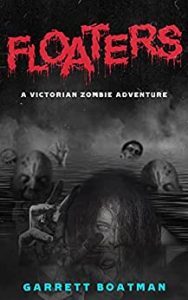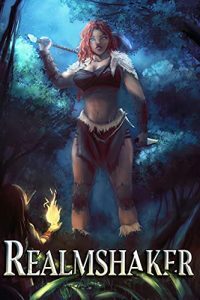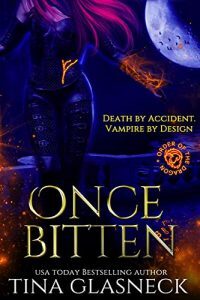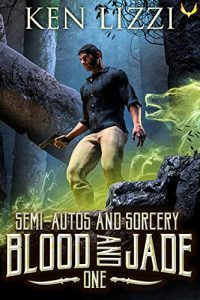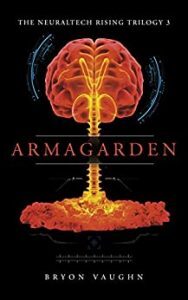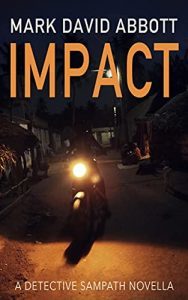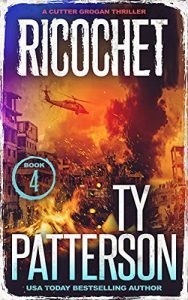Cora Buhlert's Blog, page 36
October 9, 2021
Foundation realises that there are “Barbarians at the Gates”
Looks like I’m doing episode by episode reviews of Foundation, so here is my take on episode 4. And yes, the Octocon report is coming, but I had a very busy week. Reviews of previous episodes of Foundation as well as two actual Foundation stories may be found here.
Warning: Spoilers behind the cut!
The very first Foundation story – entitled simply “Foundation”, when it was first published in Astounding Sciencen Fiction in May 1942, and “The Encyclopedists” for the book edition – is a comparatively short novelette, under 10000 words long. The Foundation TV series has now spent two episodes of 49 and 45 minutes respectively and still hasn’t reached the end of this short novelette.
As I said in my previous review, adapting “Foundation”/”The Encyclopedists” as is would not make for a thrilling TV show, because the novelette is a basically a series of meetings and men talking in boardrooms. So it’s obvious that they would have to change the plot of the story a lot for the series. And indeed, very little of the original story remains except for the names of some characters, the basic conflict – Terminus is under threat from its “barbarian” neighbours and the Empire is doing fuck all to help – and oddly enough the coin that Salvor Hardin likes to toss and irritate people with, something he/she does both in the original story and the TV show. And I like that they kept the coin, because it is a nice hat tip to the original story.
Still, how do you take a story that’s 15 pages long in the magazine version and 44 pages in the book version and stretch it to more than 90 minutes. Simple. You add a lot of padding. And that’s exactly what Foundation does.
For example, the many scenes featuring the Emperors Three are entirely padding, since the Emperor (just one) doesn’t even appear in the Foundation trilogy until the second book Foundation and Empire. We occasionally see imperial remnants in earlier stories, most notably in “The Big and the Little” a.k.a. “The Merchant Princes”, but mostly the Foundation stories focus on the Foundation and Terminus and pay little to no attention to the Empire.
The TV show, however, seems to have settled into a pattern of dividing its time equally between the Emperors Three, i.e. a plotline that’s not in the books at all, and Terminus, a plotline which is at least loosely based on the original stories. At least, the Emperors Three plot is generally compelling. And indeed, both AV-Club reviewer Nick Wanserski, who hasn’t read the books, and Paul Levinson, who has read them and is a big fan, find the Emperors Three plot more compelling than the Terminus plot, which is a problem, because the latter is what the books are actually about.
So what are the Emperors Three and Demerzel up to in this episode? By now, the time has moved forward to approximately thirty-five years after the exiling of the Foundation and the terrorist attack on the Skybridge. The city world of Trantor still bears a scar from the attack nor is there any indication that they are rebuilding the Skybridge – after thirty-five years. For comparison, thirty-five years after the end of WWII. i.e. in 1980, the bombed out German cities and infrastructure had long since been rebuilt (the rebuilding mostly happened in the 1950s with a few laggards in the 1960s) and improved compared to the pre-war era. There were a few remaining ruins or empty plots of land – inevitably hidden behind billboards, so passers-by wouldn’t see what was or rather wasn’t there – but that was mostly because no one knew who owned those plots of land. The fact that the Empire hasn’t even managed to rebuild their capital in thirty-five years shows that they really are in decline. And yes, the destruction of Trantor was massive, but not more massive than the reducing entire countries to rubble during WWII.
As we saw last episode, the Emperors Three have moved one up now. The gleefully tyrannical Brother Day of the first two episodes is now Brother Dusk. The terrified kid Brother Dawn from the first two episodes is now Brother Day, the prime Emperor. And the baby decanted in the previous episode is now a teenaged Brother Dawn. Only Demerzel is her unchanging robotic self.
So far, the Emperors Three seem to have gotten along well with each other, but this trio is at odds. The current Brother Day blames Brother Dusk both for the terrorist attack, the brutal retaliation, which he now claims he never agreed with, but only pretended to agree, because he was terrified of the then Brother Day, and the generally poor state of the Empire. Brother Day also suspects that Hari Seldon and his followers are to blame for the Empire’s problems, since some recent events – riots on Trantor, the failure of a vital communications relay and a religious schism – echo some of Seldon’t predictions at his trial. Brothers Dusk and Day were never really impressed, let alone scared by Seldon, but it makes sense that Brother Dawn, who was only nine years old at the time, would be scared and traumatised by the events and would also link Seldon to the Skybridge attack, because he experienced both at the same time.
Of the crisises facing the Empire, the religious schism is given the most time. In short, the leader of an important religion with billions of followers has died – we see her funeral in an early scene – and there is a challenger to her designated successor. And this challenger promotes a belief that is deemed heretical, namely that one human being only has one soul. The Emperors, however, are three human beings – of fourteen clones altgether – sharing the same body. According to the heretical belief, it is questionable whether they have a soul, which could lead to revolts and uprisings down the line, so that heresy must be stamped out and he ascension of the heretical would-be leader prevented.
I have to admit that my eyes glazed over during this discussion about the beliefs of a fictional religion. I also find that the TV version of Foundation pays way too much attention to religion, first with Gaal and the anti-tech cult she left and now with the religion of the white-robed women who debate whether clones have souls. It’s obvious that any entity as large as the Empire would have any number of religions, including weird ones, but we see very little of this in the books. We do have a society, whose religion forbids all technology on the pain of death in “The Wedge”, but the only religion which plays any real role in the original Foundation stories is Scientism, a cult which worships nuclear power and is very much a scam devised by Salvor Hardin to control the four kingdoms, something I really hope we get to see in the series. Nor was Scientism the only fake religion to appear in the pages of Astounding in the 1940s – no, “science disguised as a scam religion” was a very common trope during the golden age, particularly in Astounding. Fritz Leiber’s 1943 novel Gather, Darkness! is another example that is quite a bit weirder than Foundation’s scientism.
Isaac Asimov was a secular Jew and avowed atheist who had no real connection to Judaism, as this article by Stephen Silver explains. Asimov apparently developed an interest in the Bible later on and indeed, there are quite a few biblical references in The Caves of Steel (which baffled my teenaged self, partly because I had trouble locating the respective Bible chapters due to transliteration and translation disparities*, and partly because I wondered why a Jewish author would include references to the New Testament in a novel). However, The Caves of Steel was published in 1953, eleven years after the first Foundation story. The Isaac Asimov who wrote those stories had little to no interest in religion of any kind and was writing in an environment, where religion was not considered a suitable subject for science fiction, unless it was a scam. There were religiously tinged science fiction stories published in the 1940s, but not in Astounding.
Therefore, I find the focus on religion in the TV show baffling, since the spirit of the original stories is very much anti-religious, unless you view the Foundation as a cult that worships the hologram of its dead leader, which is a valid reading. I also wonder whether they couldn’t have found another crisis for the Emperors Three to deal with than an impending schism in a religion of white-robed women that we’ve never even seen before. Because the whole religious schism and heresy issue is mainly an excuse to get Brother Day to break with protocol and leave Trantor himself, something which is not done, rather than leave the issue to Brother Dusk.
The current Brother Day is also more hands on in other respects. Since this Brother Day is worried about Seldon and his predictions, he has several members of the Royal Institute of Statistics summoned to the palace to inquire if they have made any progress replicating or analysing Seldon’s calculations. Alas, the mathematicians have made as much progress as the Empire has made rebuilding the Skybridge in thirty-five years, namely none. This infuriates Brother Day so much that he channels his inner intergalactic tyrant – he used to practice in front of the mirror, he tells Brother Dusk at one point – and pitches an epic fit that causes the head mathematician to drop dead of a heart attack. He should have just asked the Second Foundation, who already have to be lurking on Trantor in this time, instead.
And talking of the Foundation, since Brother Day is the one who’s worried whether Seldon was right and whether the Foundation are a threat, Brother Day also dispatches an Imperial envoy named Lord Dorwin to Terminus. Lord Dorwin actually appears in the original story, where he is a pompous and hopelessly ineffective Imperial official who can’t really help Terminus agains the Four Kingdoms. This character is one of the very few things the episode actually took from the original story.
Those folks who want Foundation to be Game of Thrones and only watched the latter for the sex scenes are also treated to a scene of Lee Pace’s Brother Day attempting to have sex with what appears to be a high class prostitute. Havin sex is not so easy for the Emperors Three, because they are surrounded by a personal forceshield (which is something that actually exists in the books, though differently) that repells kinetic energy, so you can only touch them if you move very slowly and very carefully. The prostitute is just about the get the hang of it, when Brother Day experiences the ultimate coitus interruptus in the form of Demerzel walking into his bedroom and icily remarking that she knows that the Emperor has physical needs that have to be satisfied once in a while, but that there is a crisis he has to attend to. Since I suspect Daneel/Demerzel would have learned in twenty-thousand years that interrupting humans while they have sex is just rude, I bet she did it on purpose. Most likely, Daneel/Demerzel is jealous.
While Brothers Dusk and Day are sniping at each other, they are both neglecting the teenaged Brother Dawn. This is a mistake, because this Brother Dawn has plenty of issues that should be attended to, preferably before he becomes the prime Emperor. The episode actually opens with Brother Dawn attempting to commit suicide by hurling himself out of his bedroom window. However, the same personal forceshield that frustrates his brother’s attempts to have sex saves his life. The suicide attempt is witnessed by a young woman who works in the gardens, a woman with whom Brother Dawn becomes obsessed. The gardener offers him a medicinal plant against the lingering pain from the suicide attempt, so Brother Dawn accepts the plant – after testing it on another staffer first – and also builds a dragonfly drone to spy on the young gardener.
So in short, we have an aged tyrant, who screwed up the Empire and committed genocide, a prime Emperor who at least tries to do better, but is still trapped by circumstances and genetics, and a suicidal teenager who creeps on random gardeners. Truly, the Empire is screwed.
Meanwhile, on Terminus, Salvor Hardin has met the Anacreonians, who have snuck ont the planet’s surface undetected and threated Salvor with bow and arrows. Since the Anacreons – who have ditched the tree cosply in favour of Xena – Warrior Princess cosplay – outnumber Salvor, she is briefly taken prisoner. The Anacreons claim to be scrappers looking for the colony ship’s navigation unit, but Salvor tells them it was removed long ago. So they force Salvor to take them to Terminus City, where the unit is kept. Since Terminus City is surrounded by a force field fence, Salvor tells them she can only take one person through the field. That one person is the leader of the group, a scarred woman named Phara (Indian actress Kubbra Sait). It turns out that Phara does have a blaster as well, though she does carry bow and arrow and knows how to use them. However, Salvor tricks her by piloting her landspeeder too close to the Time Vault and its repellant field (which doesn’t work on Salvor), knocking her out.
Salvor takes Phara prisoner and interrogates her, but Phara keeps insisting that her people are just scrappers. Since Phara’s comrades are still outside the forcefield fence, Salvor also arms her few troops and tells them to keep watch. “Violence is the last refuge of the incompetent”, Salvor’s Dad, the mayor of Terminus City, tells her. “That’s an old man’s doctrine”, Salvor counters.
Now “Violence is the last refuge of the incompetent” is an actual line from the first Foundation story. However in the story, it is uttered by Salvor Hardin, who in the books is a fount of aphorisms, and not by his/her father. This line could also be used as an epigraph for the entire first book, because the Foundation prefers to solve problems with cunning and intelligence rather than violence, at least partly because they are not powerful enough to stand against their more aggressive neighbours. And indeed in the book, Salvor takes down the Four Kingdoms without engaging in any physical iolence.
The brains over brawn ethos, which is summed up by that one line, is one of the things that initially attracted me to the Foundation stories. Because I loved reading about smart people solving problems with their brains rather than with violence. And to see TV Salvor rejecting one of the sayings that are associated with the character hurts. Of course, it’s still possible that Salvor eventually comes to see that her Dad was right, but this is yet another storytelling choice that is just baffling. Salvor Hardin doesn’t need to be a white man or indeed a man of any race (since Salvor’s race is never specified in the original stories) at all and I have no problem with Salvor being a black woman with parents and a lover. However, it would be nice if Salvor were at least vaguely the same character as in the stories.
Salvor, her parents and Hugo also examine Phara’s bow and realise that the Anacreons have not really been reduced to using bow and arrow, as I assumed in my last review, but that the bow is ceremonial, since Anacreon’s culture is obsessed with hunting. And the fact that Phara has the ceremonial bow means that she is not just a random scrapper, but the Great Huntress of Anacreon and someone very important indeed.
Anacreon in the books is a neo-feudalist kingdom, which wants to carve up Terminus into estates and have peasants work the land, which was as anachronistic in 1942 as it is today. Their representative is a pompous self-styled aristocrat named Anselm haut Roderick. Meanwhile, Anacreon in the TV series is a post-apocalyptic society with a hunting obsession and a taste for leather garb, whose representative is a scarred Xena cosplayer, which is no less anachronistic than the neo-feudalist kingdom of the book.
Since Phara is still not talking, Salvor calls in Hugo, who has more experience with Anacreons and who attempts to intimidate her by flashing his eyes weirdly blue at her. The Thesbian delegation we saw in the first two episodes had those weird blue eyes as well. Finally, Salvor deduces from Phara’s facial scars that she was wounded during the bombing of Anacreon thirty-five years before. And since the bombing killed off half of Anacreons population within a week and another twenty percent within a year, Salvor deduces that Phara lost her family in the bombing, which is why she is so angry. Of course, none of this is really a huge feat of deduction – after all, when faced with the scarred survivor of the devastating war, it’s likely that they’ve lost someone.
Eventually, Phara also reveals what the Anacreons want from the Foundation. Cause it turns out that they really just want the navigational device from the Foundation’s colony ship, since the devastated Anacreon is no longer capable of supporting its much reduced population, so the Anacreons want to use what ships they have to look for greener pastures. However, they have no navigation tech. So apparently, navigation technology will take the place of nuclear power in the TV show.
As for the Empire killing off seventy percent of the population of Anacreon (and Thesbis), we already knew that the ex-Brother Day, now Brother Dusk revelled in his intergalactic tyrant role and that genocide and mass executions were exactly the sort of thing he would do. However, I do think that Demerzel needs to have her positronic brain examined, because she seems to have forgotten about the Three Laws of Robotics. Of course, the Zeroth Law, the one that Demerzel/Daneel and their old pal Giscard came up with, allows them to occasionally let humans come to harm, if this is for the good of all humanity. However, killing off millions of innocents clearly isn’t beneficial for the good of all humanity.
Lewis Pirenne, the head of the Encyclopedists, also shows up to question Phara, with even less success than Salvor. Now Lewis Pirenne is a character who also exists in the books and is actually Salvor’s chief antagonist. He’s also the closest to his book counterpart, because Lewis Pirenne is an incompetent arsehole in the books and an incompetent arsehole in the series.
While the Anacreons are gathering outside the fence and turn out to be a lot more than expected, Salvor, Lewis, Hugo and Salvor’s parents are debating what to do. Salvor experiences another weird episode, a flashback where she finds herself in the Imperial Library on Trantor – the place where Gaal Dornick first met Hari Seldon. She also sees the mysterious phantom kid she’s been chasing again, only this time the kid turns around and is a black boy wielding a knife. It’s a knife we’ve seen before, wielded by Raych, when he murdered his adoptive father Hari Seldon (something the show still hasn’t addressed). Salvor has never met Raych, so she’s clearly having visions of the past.
Now Salvor Hardin in the books is a very shrewd and intelligent, but otherwise perfectly ordinary person. He is no one whose coming was foretold by Seldon, because psychohistory cannot predict the actions of individuals, just general trends – a fact that the TV show repeatedly notes. And the books make it clear that if Salvor Hardin wouldn’t have been the mayor of Terminus City who came up with a way to hold the Four Kingdoms at bay, someone else would have done it.
Salvor in the TV series, on the other hand, is special, as we are repeatedly told. TV Salvor also obviously has psychic powers of some kind, as Camestros Felapton notes in his review of this episode. Now telepathy exists in the Foundation universe – the original stories were published in John W. Campbell’s Astounding, after all. However, telepathy is very rare in the Foundation universe. The only humans who have it are the Mule and the Second Foundation (and Raych’s daughter Wanda in the prequels). R. Daneel Olivaw also acquires telepathy from his pal R. Giscard.
Book Salvor Hardin, however, has no psychic abilities of any kind – and TV Salvor seems to be some kind of clairvoyant rather than a telepath, an ability that is never mentioned at all in the Foundation series. I honestly have no idea why the TV series felt the need to make Salvor psychic and super-special in general. In fact, Salvor is so special and different that Lewis Pirenne wonders whether her mere existence might not upset the Seldon Plan. Hold that thought, Lewis, and jot it down somewhere, cause it will come in handy in approx. two hundred years, when the Foundation meets the Mule.
The episode ends with the Anacreons assembling a very big gun outside the forcefield fence and preparing to fire at Terminus city. Meanwhile, a mysterious spaceship picks up the escape pod in which Gaal Dornick has been lying in suspended animation for thirty-five years now.
It was obvious that the TV series could not adapt “Foundation”/”The Encyclopedists” as it is, because the story is a little dull and not very cinematic and dated, too. That said, a lot of the storytelling choices just make zero sense.
The main conflict in “Foundation”/”The Encyclopedists” is the conflict between the Terminus and Anacreon. But there is also a secondary conflict between the Encyclopedists as represented by Lewis Pirenne, who still believe that their main purpose is compiling the Encyclopedia Galactica to stave off the encroaching dark ages, and the first generation born on Terminus for whom Terminus is their home and who couldn’t care less about the Encyclopedia, a generation that is represented by Salvor Hardin in the books. The conflict between these two fractions is compelling enough IMO, especially since it signals the turn of the Foundation away from the Encyclopedia Galactica (though it’s notable that the Encyclopedia does get written eventually, since it provides the epigraphs for the stories) to becoming the bastion of knowledge and kernel of the second empire or whatever will arise from the ashes of the dark ages. And indeed, the TV show hints at this conflict by putting Salvor at odds not just with Lewis Pirenne, but also with her Enyclopedist parents. I just don’t understand why we need to add layers of specialness and psychic powers to Salvor, when book Salvor never needed more than his wits. Why not simply have Salvor be what they are in the books, namely a highly intelligent person and the representative of the generation for whom Terminus is home and who don’t give a damn about the Encyclopedia, but care very much what happens to Terminus? With the added threat of the Anacreons, that would be conflict enough.
Foundation has been renewed for a second season, which is a very good thing, because considering the glacial pace at which the show moves (at least three episodes for a short novelette), the first season probably won’t even get through the first book. Also note that we haven’t had any casting news for Hober Mallow or Limmar Ponyets. And I really want to see Hober Mallow engaging in some nude sunbathing and cigar smoking with his male friend. I also want to see Bel Riose (finally a reason to dust off the Cleons) and the Mule and Bayta and Arcadia Darrell, etc…
So far the show is still enjoyable enough, though many of the storytelling choices and departures from the books make little sense. I hope that the showrunners will pull everything together eventually and give us a story that is not exactly like the books – because that would neither be possible nor make for good TV – but yet close enough in spirit to be recognisable as Foundation.
*I even took my copy of The Caves of Steel to my high school religious education teacher, showed him the biblical references and asked him which chapters of the Bible they referred, because I wantd to read them and had problems finding them. The poor man was very baffled, even though he should have been aware of the translation and transliteration issue. But then, he was not a very good teacher and didn’t know much about his supposed subject either. Also, what sort of religious education teacher sends a student away, when they have a question about the Bible?
October 6, 2021
First Monday Free Fiction: Ritual Failure
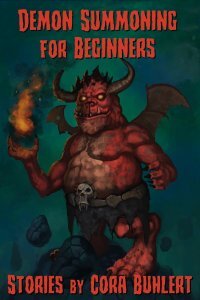 Welcome to the October 2021 edition of First Monday Free Fiction, which goes out on a Tuesday, because I was really busy yesterday and just forgot to post this.
Welcome to the October 2021 edition of First Monday Free Fiction, which goes out on a Tuesday, because I was really busy yesterday and just forgot to post this.
To recap, inspired by Kristine Kathryn Rusch who posts a free short story every week on her blog, I’ll post a free story on the first Monday of every month. At the end of the month, I’ll take the story down and post another.
October is the spooky month, so it’s the perfect time to post a spooky story. Of course, I’m still horror-impaired, though I’m getting better, so most of my attempts at writing horror either turn into “Let’s figure out what the ghost/werewolf/vampire/insert monster here wants” or they turn into humour pieces skewering horror tropes.
This month’s story, from the collection Demon Summoning for Beginners, falls into the latter category. And if you want to read all of my spooky stories to date, check out The Spooky Bundle, available exclusively at DriveThruFiction, where you can get all of my attempts at writing horror in one handy bundle at a reduced price.
So follow Lucas, as his attempt to summon a demon goes quite differently than expected.
Ritual FailureLucas took a deep breath. Everything was ready.
The altar had been prepared and the ritual circle had been drawn on the basement floor with chalk pilfered from the classroom. A gong had been set up. The candles and the incense — proper church incense and not those joss sticks from the Chinese import store — awaited. The correct page was bookmarked in the ancient grimoire he’d found in the local used book store. Lucas had put on a ceremonial robe that looked only a little bit like the bathrobe it was. The athame was ready — forged of virgin steel as required (though Lucas wasn’t sure if there even was non-virginal steel — after all, who had sex with daggers?). He’d even procured a sacrifice, a clucking chicken that had gifted him with a bonus egg it had laid that afternoon.
Lucas checked his wristwatch. The hour was here, determined by arcane calculations. In its cage, the chicken clucked and idly picked at some grains.
Time to get started. Time to summon a demon, a real bona-fide demon. A demon who would hopefully help Lucas win the heart and undying love of Bethany Morris, the prettiest girl in his class.
Lucas lit the candles and the incense and promptly inhaled a plume of smoke, which caused a violent coughing fit and drove tears into his eyes.
So Lucas had to step out of the circle again to get his inhaler, which he’d forgotten. Of course in theory, you weren’t supposed to leave the circle, once the ritual had started. But then, Lucas hadn’t gotten started yet, not really. All he’d done was light the incense and the candles. And besides, he was extra careful not to smudge the chalk lines that marked the circle.
Once he’d dealt with his inopportune coughing fit, Lucas picked up the grimoire and began to read, solemnly intoning the words. The summoning ritual was in Latin with a bit of Hebrew sprinkled in, as magical rituals tended to be.
Of course, Lucas spoke neither Latin nor Hebrew, so he had absolutely no idea just what he was intoning. He only hoped it wasn’t something terribly embarrassing.
Besides, the guy in the used book store who’d sold him the grimoire had said that most magicians did not actually speak Latin, let alone Hebrew. It was perfectly okay just to recite the words.
So Lucas did just that. He recited the words, struck the gong at the prescribed moments and did his best to ignore the clucking chicken. He did all that and nothing, absolutely nothing happened, except that the chicken began to pick at stray crumbs of ash raining from the incense burner.
After about ten minutes of nothing happening, Lucas began to feel very silly indeed. After all, he was standing here in his bathrobe in the basement, breathing incense fumes that made his asthma flare up and reciting strange words in a language he did not understand, while a chicken offered a running commentary in clicks and clucks.
It was, in a word, ridiculous. And obviously not going to work, because there was no sign of a demon, not even the faint smell of brimstone, whatever brimstone was supposed to smell like. Unless it smelled like this godawful stinking church incense he’d bought.
Lucas abruptly stopped and plopped down on his butt in the middle of his magical circle. He looked over at the cage with the clucking chicken and wondered what to do with it now. The ritual called for slitting its throat with the athame and spilling its blood on the altar, but Lucas probably could never have brought himself to do that anyway. The chicken was a living creature, after all, and Lucas was just too damned soft-hearted to kill it, demon summoning ritual or not.
Maybe he could just keep the chicken as a pet. After all, he’d always wanted a pet. And fresh eggs every morning would sure be nice and a welcome change from last night’s stale pizza.
So he reached for the cage and got to his feet. “Sorry, pal,” he said to the chicken, “I wasn’t really going to slit your throat, you know? No hard feelings, okay?”
And then, as he was just about to leave the circle, the cage with the chicken in hand, the unthinkable happened. A demon appeared in a puff of smoke that stank of the aftermath of a high school chemistry experiment gone wrong.
Okay, so that’s what brimstone was.
“I am Razariel, the Fearsome, and that was the worst Latin I ever heard,” the demon thundered.
The creature looked just like Lucas had expected a demon to look. Blood red skin, yellow eyes, cloven hooves, horns and a spiked tail.
“It’s ‘sacrificio’ with a k-sound, not an s-sound,” the demon continued, clearly infuriated.
Lucas took a step back, stumbled over the altar and promptly landed on his butt, though thankfully still inside the circle. The chicken squeaked in protest.
“I… I beg your pardon,” he stammered.
“Your Latin is absolutely abominable,” the demon continued, “And don’t even get me started on your Hebrew. At any rate, I suspect those strange throat-clearing noises you just made were supposed to be Hebrew. Cause if they were really just throat-clearing, I’d see a doctor about that. What do they teach you kids at school these days?”
“Ahem, I… I took Spanish,” Lucas stammered.
“Well, next time before you summon anybody, learn proper Latin first,” the demon snarled, “And is that a chicken? Let me guess, you wanted to sacrifice it to gain my favour?”
“That was the idea, yes.”
“Do I look like I want a chicken?” the demon demanded, “If I get a hankering for chicken, I go to Kentucky Fried Chicken just like everybody else. But if I’m to be summoned, I at least expect a nice, juicy virgin, preferably two, as a reward.”
The demon sniffed the air.
“Oh dear, you are a virgin,” it said.
Lucas felt himself blushing furiously. “Uhm yes, but…”
“You weren’t planning to sacrifice yourself, were you?”
Lucas shook his head.
“Well, good for you and the chicken here that I’ve just had a nice big, super-spicy burrito and am not hungry anyway. And just a tip, next time you want to summon someone, bring a burrito rather than a live chicken…”
“I… I’ll remember it, thanks.”
The demon sighed, emitting a burp of sulphur in the process.
“All right, so you summoned me. Congratulations. Now tell me what you want, so I can get back to my Narcos binge.”
“Uhm, I… I…”
“Are you brain-damaged or just stupid? You did summon me for a reason, did you? Not just to see if I would show up. Cause I’m warning you, we demons don’t like jokers who summon us just to prove a point.”
“I didn’t,” Lucas said hastily, “I really wanted something.”
The demon tapped its cloved-hoofed foot, while its tail swished back and forth. “Well, what?”
“B… Be… Bethany Morris. I want the undying love of Bethany Morris.”
The demon rolled its yellow eyes. “That’s all? You summon a demon from hell and interrupt my Narcos binge just to win the heart of some girl? What happened? Was the local occult shop all out of love charms? Or did you accidentally open that grimoire on the wrong page and ended up with a demon summoning spell instead of a love spell?”
“I… It said in there…” Lucas pointed at the grimoire. “…that you would grant me my heart’s desire. And my heart’s desire is the undying love of Bethany Morris.”
The demon emitted another sulphurous sigh. “Humans. So predictable. You are aware that she’ll probably want to get married and move to the suburbs one day, that the sex will get boring and that she’ll get fat and that she’ll want babies that cry and poop all the time…”
The demon glared at Lucas with its yellow eyes.
“So are you really sure you want Bethany Whatshername and not riches beyond your imagination or everlasting fame or to become the best blues musician of all time or one of the other classic wishes?”
“No, I…” Lucas hesitated for a moment, because fame and fortune and musical talent and riches beyond his imagination really did sound tempting. “…I want the love of Bethany Morris.”
“All right then…”
The demon made a few strange gestures that looked a bit like interpretative dance and mumbled some words in what Lucas presumed was correctly pronounced Latin. Or maybe it was correctly pronounced Hebrew.
“There. That’s it,” the demon said with a toothy smile, “Now go find Bethany Whatshername and talk to her, which is what you should have done in the first place. Maybe tell her you summoned a demon to win her love, cause that’s sure to impress her.”
The demon looked Lucas up and down with its yellow eyes.
“On the other hand, maybe not. Anyway, if we’re all done now, then good-bye and all that jazz. Narcos awaits.”
The demon vanished in a puff of foul-smelling smoke.
When it was gone and Lucas had stopped coughing, he turned to the chicken.
“All right, so do you think I should call Bethany?”
The chicken clucked once. Lucas decided to take that as a yes.
The End***
That’s it for this month’s edition of First Monday Free Fiction. Check back next month, when a new free story will be posted.
October 2, 2021
Foundation Meets “The Mathematician’s Ghost”
I’m still not sure, if this will be an ongoing series of episode by episode reviews, but I did watch the third episode of Foundation, though the review is a little late, because I was also at the virtual Octocon this weekend (a con report is coming). Meanwhile, Reviews of previous episodes of Foundation (well, just two so far) as well as two actual Foundation stories may be found here BTW.
Warning: Spoilers behind the cut!
The third episode of Foundation takes a step forward to the very first Foundation story – entitled only “Foundation”, when it was published in Astounding Science Fiction in 1942, but known to those of us who have read the book versions as “The Encyclopedists”. But in order to take that step forward, the show first takes a step back four hundred years in time (Foundation only deal in centuries) to the very first Emperor Cleon who was so eager to cling to power that he cloned himself. And so the episode opens with Cleon I (Terrence Mann in old age make-up) observing the Skybridge space elevator being built, Demerzel/Daneel by his side. Cleon I is dying and he knows it. He wishes that he could stand on the docking platform atop the Skybridge with Demerzel, but Demerzel will stand there with another Cleon.
Fast forward some 419 years and Demerzel is standing next to another dying Emperor, namely the Brother Dusk from the first two episodes (also played by Terrence Mann in old age make-up). Nineteen years have passed since the terrorist attack on the Skybridge (and we still don’t know who’s responsible, since the Anacreonian and Thesbian fall guys clearly didn’t do it) and the Imperial Threesome is about to shift forward. The next Brother Dawn is about to be decanted (literally, since the Emperors are grown in artificial wombs watched over by Demerzel who sings lullabyes to them), which means that there is one surplus Emperor, because there can only ever be three. Why can there only ever be three? There’s no real explanation beyond the fact that more Emperors would mean either hiring more similar looking actors or spending more time and money on old age make-up.
So the episode follows the soon to be ex-Brother Dusk through his last day in the universe. Brother Dusk is still working on the massive mural he’s been working on for decades – in fact, he is known as Cleon XI the Painter – putting some finishing touches on the mural. He has his death robes fitted and talks to Demerzel who assures him that she will remember him, because she remembers everything. She also tells him that all the Cleons are different and that they all leave her too soon.
This bit is interesting, because it explains why Demerzel supports that whole cloning enterprise. Because Daneel/Demerzel is approximately twenty thousand years old at this point and has seen countless people die, including people who meant something to her. And she can remember them all, which means she’s probably still mourning them all, too. Because no matter what Daneel/Demerzel was in the beginning, by now she is very much a sentient, feeling being. And mourning all the people she lost over twenty thousand years must be traumatic to her. Hell, she’s probably still mourning Elijah Baley, who was after all Daneel’s first human. Even in the books, it was always clear how important Elijah was to Daneel. And if Daneel always had a female body in this version of Foundation, this would also put an interesting spin on her relationship with Elijah.
So the whole Imperial cloning scheme may well be Daneel/Demerzel’s desperate attempt to finally get to keep a human she cares about, only to see him dying over and over again in slight variations. In his review of the episode, Camestros Felapton also goes into Daneel/Demerzel’s role in Foundation and whether he/she will turn out to be humanity self-appointed guardian, as in the books, or the series’ main villain. I really hope they won’t make Daneel/Demerzel the main villain, because that would completely undermine what is the most important character in Asimov’s whole oevre.
The robot who can’t come to terms with the fact that his humans keep aging and dying is actually pure Asimov. It just isn’t Foundation, but the basic plot of “The Bicentennial Man”, only that the humans who keep aging and dying are not clones, but the robot’s family, the Martins.
Brothers Day and Dawn as well as Demerzel also take the aged Brother Dusk for one last flight up to the Skybridge docking platform, which is still orbiting Trantor, complete with a hologram of the Emperor in his Lee Pace form welcoming the non-existent visitors. However, the orbit of the platform is decaying, so it needs to to destroyed. And if you needed any confirmation that the Empire is in decline, the fact that they haven’t even gotten rid of the ruined docking platform (not switched off the hologram), let alone started to build a replacement space elevator in nineteen years certainly is proof.
After the flight to the docking platform, the now ex-Brother Dusk is met by the newly ascended Brother Dusk, Brother Day (the Brother Dawn kid from the first two episodes) and the newly decanted Brother Dawn, who’s still a baby being held by Demerzel and the new Brother Day (Lee Pace briefly forgets that he’s supposed to be an intergalactic tyrant and just bobs around the baby, clearly enjoying himself). The former Brother Dusk is now Brother Darkness. He steps into a disintegration chamber (“Thanks for all your hard work for the Empire, now die.”) and is reduced to ashes, which are smeared onto the forehead of the new Brother Dawn. The baby is then placed in a crib underneath the mural his predessor so painstakingly painted.
Fast forward another fifteen years and the now teenaged Brother Dawn is having servants erase the mural (and Brother Dusk’s hard work), because he claims to have outgrown it. So much for rejecting tradition.
These scenes, which take up almost half the episode, are genuinely moving and well acted. However, they also have fuck all to do with Foundation and their only purpose seems to be to remind viewers that time has passed and that the Emperors Three they’re about to see are not the same people as in the first two episodes. Never mind that the story already made the cloning concept clear and that a simple caption would have done the job just as well and left more room for the main story, namely what the Foundation is doing on Terminus.
The Terminus section is introduced by a voiceover courtesy of Lou Llobell, the actress who plays Gaal. So she is the narrator’s voice we’ve heard all along, which suggests that Gaal – a one-of character in a single short story in the original – will be around at least until the time of the Mule.
If you were wondering what happened to Gaal and what happened to Raych, after he murdered his adoptive father at the end of the previous episode, well, keep wondering, because the episode doesn’t tell us. However, Raych is no longer around, when the Encyclopedists finally reach Terminus, which suggests that he was thrown out of the nearest airlock. Nonetheless, I wonder why they had to have that dramatic out-of-character murder at all, when they’re not even going to address it. “Hari Seldon died of old age en route to Terminus” would have worked just as well.
We get a few brief scenes of the Foundationers arriving on Terminus, finding the Vault already there and finding themselves unable to go near it. The Foundationers have no idea what the Vault is, whether it’s an alien artefact (nope, Foundation is set in a purely human universe) or a probe sent ahead by the Empire to spy on them. Of course, those of us who have known the books know what the Vault is, though in the books the Vault is in Terminus City and sealed by a timelock controlled by an atomic clock. Of course, the big question is how did the Vault get to Terminus. Did Hari send it ahead? Was it the doing of the Second Foundation?
We now get a timelapse sequence of the Foundationers scuttling their colony ship and using the parts to build their city, which looks like any Star Wars frontier town. It’s somewhat more primitive than the Terminus City of the books, but then Asimov never really payed much attention to how Terminus was settled and also underestimated the difficulties the colonists would face. It’s probably no surprise that the western is one genre Asimov never dabbled in, though he otherwise tried to write his way through the Dewey Decimal System.
We also meet Salvor Hardin again and learn that she (Leah Harvey is non-binary, but Salvor Hardin is female in the series, so I’m using she/her pronouns) is a member of the first generation born on Terminus, the daughter of two of the original settlers whom we already saw in the previous episode. This Salvor appears to be younger than her book counterpart. She’s also not the Mayor of Terminus, that’s her Dad, but the Warden of Terminus, who watches the perimeter, chases around stray kids and defends the town against the entirely non-Asimovian aliens monsters that inhabit Terminus. Salvor’s Mom is a senior Encyclopedist.
Like all teenagers, Salvor rebels against her parents. She has zero interest in the encyclopedia and thinks that her parents’ faith in Hari Seldon is akin to a cult. She’s not wrong either. Salvor’s Dad swears by Seldon’s ghost at one point and about the only thing in Terminus City that’s not needed for bare survival is a big statue of Hari Seldon in the town square, a statue that resembles the Lenin statues once found on every town square in Eastern Europe, as Paul Levinson points out in his review.
In the books, Salvor Hardin as the representative of the civilian government of Trantor is opposed to the Encylopedists, but it’s a political, not a personal opposition. Salvor’s main antagonist in the original story is Lewis Pirenne, head of the Board of Trustees of the Encyclopedia Galactica. Lewis Pirenne exists in the show and is just as much a jerk as he is in the original story. However, the conflict between Salvor and her parents, most notably her mother, doesn’t exist in the books and is apparently an attempt to give the character’s conflict a personal dimension. In his review at The AV-Club, Nick Wanserski notes that after Gaal Dornick’s opposition to her parents’ anti-science religion, this is already the second time that Foundation turns a general social or religious conflict into a family drama. I guess just as in the Marvel Cinematic Universe, everybody in Foundation has parent issues.
I suspect the idea behind Salvor’s parent issues is to give the character more of a personality, because in the books, Salvor Hardin is very much a cypher. Book Salvor is a fount of aphorisms and a shrewd politician, who happens to be on the right side during the first ever Seldon crisis. We learn pretty much nothing else about Book Salvor except that he uses male pronouns, is big and broad and smokes cigars. Turning Salvor Hardin into a black woman changes absolutely nothing about the character, because Salvor Hardin has none.
While I’m perfectly fine with giving Salvor more of a personality than he/she had in the original stories, one thing that irks me is that Salvor – just like Gaal Dornick before her – is portrayed as somehow special. Because this undermines the whole point of Foundation. Because psychohistory is all about using large populations and general trends to predict future outcomes, which Hari Seldon actually explains in episode 1 of the series. Psychohistory is very much an antidote to the great man (and it’s almost always men) theory of history, which was still prevalent in the 1940s, when the stories were written, because no one individual truly matters in psychohistory, it’s the sum of all individuals that matter.
As a result, none of the various protagonists of the Foundation stories are in any way special. Gaal Dornick, Salvor Hardin, Hober Mallow, Limmar Ponyets, Bayta Darrell are not special. They’re just people who happened to be in the right place at the right time. However, if none of them had ever been born, the events would still have happened with different protagonists.
There’s only one character in the Foundation stories who’s special and that’s the Mule. And the very reason he’s special, namely random mutation which has made him a powerful telepath, is also the reason why Hari Seldon could neither foresee his existence nor prepare for it. Being special is not a good thing in the Foundation universe.
Therefore, I wonder why the screenplay is falling over its own feet to tell us how very special Salvor Hardin is. It seems as if every second line in the Terminus scenes is “She’s different”, “She’s special” and the like. For Salvor is the only one who can approach the Time Vault without succumbing to nosebleeds and fainting spells. And once, as a child, she even claimed that the Vault was calling to her. In the series, Salvor is special the way Gaal was/is special, even though neither of them was special in the books. Book Salvor and Book Gaal are very intelligent and shrewd people, but special they’re not.
Salvor’s parents, who know that being special is not a good thing in the Foundation universe, keep Salvor’s specialness a secret, though the rest of the Foudationers suspect anyway. At one point, Salvor’s Mom even tries to figure out what it is that makes Salvor special and hands her the dodecahedron that holds Hari Seldon’s plan, the plan no one could understand except Hari Seldon himself and Gaal Dornick, neither of whom are available anymore. Salvor’s Mom also manages to speak about Hari’s death without even uttering the word “murder”. Alas, Salvor can’t make heads nor tail of the calculations. She’s special, but not in that way.
The plot of the Terminus section very loosely follows the plot of the very first Foundation story written, entitled simply “Foundation”, when it was published in Astounding Science Fiction in 1942, and “The Encyclopedists”, when it was republished as part of the first Foundation book. The reason that this episode follows the plot only loosely is that “Foundation”/”The Encyclopedists” is full of beginning writer issues (Asimov was twenty-two, when he wrote it) and also not very thrilling.
Because “Foundation”/”The Encyclopedists” essentially consists of a series of meetings of men discussing the plot. First, we have Salvor Hardin squaring off against Lewis Pirenne, head of the Encyclopedists, who only cares about his encyclopedia and wants Salvor to leave him alone with his concerns about the newly independent Anacreon and Smyrno. Then, we have Salvor reluctantly welcoming one Anselm haut Roderik, a delightfully pompous envoy from Anacreon. Next we have Anselm haut Roderik, Salvor Hardin and Lewis Pirenne meeting, whereby Anselm haut Roderik tries to pressure the Foundation allowing itself to be annexed by Anacreon, while Salvor Hardin slyly tries to figure out what the true intentions of Anacreon are and also where their weaknesses lie. Finally, we have various Foundation dignities gathering in the Time Vault just in time for Hari Seldon’s hologram to show up and explain the plot to everybody, without actually offering a solution (Hari is just as helpful as Gandalf in that regard). The story literally ends with Salvor declaring that he has found the solution to their dilemma – impending annexion by Anacreon or another equally aggressive neighbour – and that it’s very obvious – without telling us what it is. Asimov supposedly ending the story without supplying the resolution to force Campbell to buy the sequel “Bridle and Saddle” a.k.a. “The Mayors”.
It’s pretty obvious that this story will not make a good TV episode as is, so “The Mathematician’s Ghost” only borrows the basic premise that Anacreon is getting uppity and Salvor is the only one who can see the danger. Meanwhile, Salvor also notices that the repellant field around the Vault seems to be expanding – almost as if the Vault is waking up. Which it is – after all, Hari Seldon’s hologram needs to dispense its sage advice.
Salvor’s regular routine of patrolling Terminus is relieved by the arrival of a Thesbian trader named Hugo who supplies the Foundationers with everything from onions to Korellian chocolate (The Korellian Republic will become relevant in “The Big and the Little” a.k.a. “The Merchant Princes”). But for Salvor, Hugo (Daniel MacPherson) isn’t just a source of rare goods, he’s also a welcome distraction, because the two of them happen to be lovers. Since Salvor Hardin barely has a personality in the original stories, we also never learn about his love life. But TV Salvor is an adult woman, so more power to her for having a pleasant no strings attached affair with a trader, even if Hugo is a tad old for her (and he is older than he looks due to suspended animation – foreshadowing). We even get the requisite sex scene for those who want Foundation to be Game of Thrones and who only watched the latter for the sex scenes. There’s also nothing wrong with the sex scene, though it still feels jarring to me in Foundation of all things, because the original stories are so very sexless.
At night, Salvor wakes up with weird premonitions of doom – she’s special, you see? – and goes on a patrol round. She chases a mysterious kid to the wreck of the scuttled colony ship, meets an alien critter called a bishop’s claw (still more of a Star Wars than an Asimov idea) and chances to spot a strange ship heading for Terminus. A magical telescope reveals that there is not one but three ships and that they are Anacreonian gunships. Hugo wants to get the hell out of Terminus and take Salvor with him, but Salvor wants to defend her home, only that the Foudationers have barely any weapons. Lewis Pirenne wants to call the Empire for help – after all, Terminus is an Imperial outpost and Anacreon officially disgraced. However, when Lewis Pirenne and the rest of the Encyclopedists try calling the Empire for help, they receive no reply. Apparently, communication lines are already breaking down.
Salvor, meanwhile, chases the mystery kid into the scuttled colony ship again and finds the bishop’s claw wounded, with an arrow in its side. This is rather alarming, because there are no arrows on Terminus except in the Encyclopedists’ store of primitive technology to preserve for the coming fall. Soon thereafter, Salvor finds herself faced by a squad of Anacreonians. Thankfully, they seem to have given up their tree cosplay. They’re also threatening her with bow and arrows! Cue credits.
The central idea behind the first two Foundation stories is that Anacreon, Smyrno, Thesbis and the fourth kingdom whose name I have forgotten have experienced technological decline in the fifty years (thirty-five in the show) since they declared themselves independent from the Empire/were kicked out of the Empire. More precisely, the Four Kingdoms no longer have nuclear power, whereas Terminus, having been settled by Encyclopedia nerds, does. Salvor Hardin tickles this information out of Anselm haut Roderick during their meeting. The solution to the threat posed by the Four Kingdoms is that the Foundation uses their superior technology to both hold them off and kindly offer to share the miracle of nuclear power with its neighbours, provided they convert to a sham religion the Foundation uses to control them.
Of course, this plotline will have to be altered, because nuclear power is now a failed cold war era technology and no longer something that promises miracles (as Asimov realised earlier than most, because nuclear optimism vanishes abruptly from his stories after 1945). However, you could easily insert another advanced technology – nano-tech, fusion reactors, magical handwavium – in place of nuclear power. Of course, technologies and knowledge just being lost and forgotten is a lot less likely in general these days than it was after the fall of the Roman Empire or even in the 1940s (a lot of German research into transgender people was irrevocably lost, because the Nazis burned the research results and there were no copies), because there will always be multiple copies of papers, books, etc… stories in various archives both online and off. Even if the whole world decided to abandon nuclear power and switch off all reactors tomorrow, we could still build new reactors in fifty or hundred years, should we want to, because all the papers, blueprints, etc… will still be available in archives around the world. This is probably also why the show bombed Anacreon and Thesbis to smithereens, to accelerate the technology loss.
However, the Anacreonians fighting with bow and arrow, even though they have gunships is just anachronistic. Yes, the spaceships are probably a legacy technology – and indeed later Foundation stories confirm that the now independent outer reaches of the Empire are using legacy technology. And yes, apparently Anacreon has no more metal than Terminus. But bow and arrow, really? If the Anacreonians have legacy spaceships, surely they have a few legacy firearms lying around. As for ammunition, during WWI and WWII everything that was not bolted down and many things that were, e.g. statues (Bremen lost this statue of Gustav Adolf of Sweden and this statue of Wilhelm I to WWII metal drives among other things), were melted down to make ammunition. Surely, Anacreon has a few surplus statues of Creon lying around.
That said, I do hope that the TV show will keep the sham religion plot, simply because it’s such a typical 1940s Astounding idea (also see Gather, Darkness! by Fritz Leiber) and also illustrates how the Foundation inevitably wins by brain over brawn (because they have barely any brawn) and how ruthless they can be. Besides, you can’t really tell either “The Wedge” or “The Big and the Little” without the sham religion plot.
However, I do think that the episode ends too early. First of all, we don’t even get to meet “The Mathematician’s Ghost”, namely Hari Seldon’s hologram. And in general, it would have been much more satisfying, if the episode had ended where the original story ended, namely with Salvor Harding proclaiming that he/she has the solution and that it’s obvious. But then, the episode spent so much time on the Emperor plot, which was interesting enough, but barely relevant, that they shortchanged the actual Terminus plot.
Still, I’ll be interested to see how they update the plot of “Foundation” and “Bridle and Saddle” for the 21st century.
September 29, 2021
Indie Speculative Fiction of the Month for September 2021

It’s that time of the month again, time for “Indie Speculative Fiction of the Month”.
So what is “Indie Speculative Fiction of the Month”? It’s a round-up of speculative fiction by indie and small press authors newly published this month, though some August books I missed the last time around snuck in as well. The books are arranged in alphabetical order by author. So far, most links only go to Amazon.com, though I may add other retailers for future editions.
Once again, we have new releases covering the whole broad spectrum of speculative fiction. This month, we have urban fantasy, epic fantasy, adventure fantasy, YA fantasy, paranormal mystery, paranormal romance, fairy tales, space opera, military science fiction, planetary romance, post-apocalyptic fiction, cyberpunk, biopunk, LitRPG, cosmic horror, historical horror, psychological horror, vampires, dragons, demons, angels, fae, giants, space marines, aliens, fae princes, space mages, Martian invasions, Victorian zombies, crime-busting witches, crime-busting ghosts, amnesiac jailers, troubled insomniacs, Cthulhu and much more.
Don’t forget that Indie Speculative Fiction of the Month is also crossposted to the Speculative Fiction Showcase, a group blog run by Jessica Rydill and myself, which features new release spotlights, guest posts, interviews and link round-ups regarding all things speculative fiction several times per week.
As always, I know the authors at least vaguely, but I haven’t read all of the books, so Caveat emptor.
And now on to the books without further ado:
Fire and plague. Certainly no strangers to London Town. But when legions of living dead rise from the Thames’ fetid waters to feast upon the living, the city teeters on the brink of antihalation. And while floaters seek blood, another army takes advantage of the chaos. Boiling out of their rookeries of crime, marauders swarm through London’s affluent neighborhoods looting and burning.
Hooligans vs the Living Dead: A Victorian Zombie Adventure!
With the beleaguered police and the Queen’s army battling twin plagues—human and inhuman—London’s criminal youth gangs join forces to save their city. Will Tagget, leader of the Lambeth Lads, together with his enemies Bill Drummond of the Drury Lane Gang, bull-necked George Fish of the Elephant and Castle Gang, shillelagh-wielding Dirk Bogart of the New Cut Gang, Quincy Bird of City Road, along with their female counterparts—Lambeth Kate, Queen Jane, New Cut Beth, Razor Lil and Dirty Deidre—set out on an adventure the telling of which might earn a man a lifetime of free drinks. If he lives to tell it.
Will these violent gangs put aside their rivalries long enough to get the job done?
Proudly represented by Crystal Lake Publishing—Tales from the Darkest Depths.
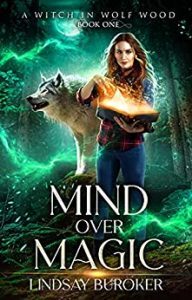 Mind Over Magic by Lindsay Buroker:
Mind Over Magic by Lindsay Buroker:
As a bookish, introverted database programmer, Morgen Keller never thought she was a candidate for a midlife crisis. That was before her husband divorced her, her boss let her go, and her grandmother died. Forty wasn’t supposed to look like this.
When Morgen heads up to the small town of Bellrock, Washington, to settle the estate, she looks forward to taking a peaceful break from life and figuring out what she’s going to do next.
But peace isn’t to be had. The old farmhouse is full of witch paraphernalia, a fearsome werewolf has claimed the property, and contrary to what the family was told, Grandma didn’t die of natural causes.
Embroiled in a mystery, and heir to powers she knew nothing about, Morgen must turn to the only person who might be able to help: the werewolf who threatened to rip her throat out for trespassing.
This isn’t the fresh start on life that Morgen had in mind.
A Witch in Wolf Wood is perfect for fans of mystery, magic, slow-burn romance, and second chances.
Rhonda is a noble giant, a huge savage beauty learning to become a ranger and a chieftess. But five centuries after a terrible war eliminated the noble giants’ civilization, Rhonda wakes up alone on a runic ritual site far from home. Her culture is plundered, erased, and nearly forgotten. Terrible beasts roam the land, and smaller beings are taking over. Stranger yet, there’s a mystical mechanism revealing to Rhonda her class, attributes, perks, star power, and more.
It’s the Star System!
And its master could be an eldritch thing covering the world, unknown to all except the giantess herself.
Follow Rhonda and her friends on an epic CONQUEST to collect star power, go berserk on their enemies, and make an impact no one can ignore. The noble giants’ civilization may have fallen, but it’s Rhonda’s birthright to shake the realm.
How much is freedom really worth?
The world ended five years ago. Caleb Franks has lived in the shadows ever since, scraping together a meager existence on his homestead with his faithful friend, a Great Pyrenees named Elim.
Then the North American People’s Army shows up, promising a new way of life: ready food, security, community, and maybe even a family someday, if he proves himself worthy. All they ask in return is absolute loyalty.
Caleb will need to make a choice: security, or freedom. All that hangs in the balance is everything.
This is a post-apocalyptic novelette. It is a work of speculative fiction and though in no way graphic, may contain elements that some readers will find disturbing.
 Simultaneous Times Vol. 2.5., edited by Jean-Paul Garnier:
Simultaneous Times Vol. 2.5., edited by Jean-Paul Garnier:
From Space Cowboy Books in Joshua Tree, California: A free e-book companion to the Space Cowboy Books Presents: Simultaneous Times science fiction anthology podcast.
Featuring stories by: Cora Buhlert, Kim Martin, Brent A. Harris, Renan Bernardo, RedBlueBlackSilver, Robin Rose Graves, Douglas A. Blanc, Michael Butterworth & J. Jeff Jones – with illustrations by: Austin Hart, Dante Luiz, Chynna DeSimone, Douglas A. Blanc, & Zara Kand.
He saved my life, only to steal it away with his dragon’s blood.
Midlife was supposed to be steady, where I’d find everything I needed and finally get it together.
Nope. Hollywood lied. Because here I was, again, trying to get my legs under me.
Literally.
I’d lost my job, fallen into the Atlantic, and woken up changed forever. Forever as in eternity forever because the blood my rescuer gave me to save my life had one itty bitty unforeseen consequence.
It made me a vampire.
I know, fang my life.
Now I’d need a miracle just to get through the day. And that miracle is Alistair, the handsome dragon shifter who saved my life and really shouldn’t exist. But he is very much a real man–and a real temptation.
And he’s offering me a fresh start that comes with a secret organization of supernaturals who live in the shadows.
Looks like I’m getting a chance to start over.
I just had to die to finally start living.
 Ghostly Endeavour by Lily Harper Hart:
Ghostly Endeavour by Lily Harper Hart:
Harper Harlow is ready to move forward with her business, which just so happens to include taking ownership of the beleaguered Whisper Cove Cemetery. She and her partner Zander Pritchett have big plans … until the day they close on the property and discover a body on one of the well-worn pathways.
Cassie Clifton is recently divorced, a devoted runner, and an individual with a lot of secrets. She was estranged from her parents before her death and apparently desperate to get out of town. Why, though? Harper is determined to figure answers, no matter how hard she has to dig.
Harper’s husband Jared Monroe is on the case but the proximity of death to his new wife has him spinning. It was supposed to be a fun business endeavor, a way for Harper to continue running her cemetery tours without oversight. It’s turned into so much more.
Harper and Jared join together, and when they uncover ties between Cassie and one of their closest friends, they’re thrown for a loop. Have they embedded themselves with a killer?
It’s a race to the finish to find Cassie’s murderer and bolster Harper’s new business in the process. It’s going to take everything they have – every member of their motley crew of friends working together – to cross the finish line safely.
Death is stalking Whisper Cove again. Will they all survive to see another day?
 Phantom Masquerade by A.L. Hawke:
Phantom Masquerade by A.L. Hawke:
And here is where I fall.
Mina Daaé dreams of performing on Broadway. Like her great ancestor, Christine Daaé, who sang at the prestigious Palais Garnier a hundred years before, Mina has the voice of an angel. But after graduating from Conservatoire de Paris, fortune fails her. Until the circus comes to town.
Mina’s close friend Toni Vollini offers her a role in his new Broadway play mixing Mozart with clowns. Known as The Harlequin, the musical is an inimitable adaptation of the opera Don Giovanni. Toni says Mina will soar, but with pathologic acrophobia, she’s afraid she’ll fall. And the ghost in her head says she will.
Toni and a ghost vie for her love, but Mina thinks her ghost is just another hallucination. Or is her ghost a phantom of the opera?
Phantom Masquerade is a contemporary adaptation of Gaston Leroux’s Phantom of the Opera integrating romance and the paranormal.
 Cthulhu Wants You by Rhys Hughes:
Cthulhu Wants You by Rhys Hughes:
A collection of short stories inspired by the Cthulhu Mythos of H.P. Lovecraft. These stories are not parodies or pastiches but darkly ironic fantasies that connect with the Mythos at a tangent. Open-minded devotees of Lovecraft may find amusement in the offbeat ideas, paradoxical plots, whimsical language and strange originality of these tales. But whether you know what you want or not, be assured of one thing: Cthulhu wants you!
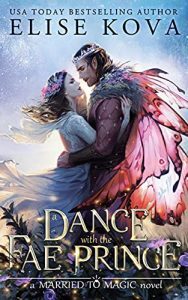 A Dance with the Fae Prince by Elisa Kova:
A Dance with the Fae Prince by Elisa Kova:
She knew her hand in marriage would be sold. She had no idea a fae prince was the buyer.
Katria swore she’d never fall in love. She’s seen what “love” means through the cruelty of her family. So when she’s married off to the mysterious Lord Fenwood for a handsome price, all Katria wants is a better life than the one she’s leaving. Feelings are off the table.
But her new husband makes not falling in love difficult.
As their attraction begins to grow, so too do the oddities within her new life: strange rules, screams in the night, and attacks by fae that Katria never thought were real. When she witnesses a ritual not meant for human eyes, Katria finds herself spirited away to the land of Midscape.
Surviving the fae wilds as a human is hard enough. Katria must survive as a human who accidently pilfered the magic of ancient kings – magic a bloodthirsty king is ready to kill her for in order to keep his stolen throne – and her new husband is the rightful heir in hiding.
The power to save the fae is in her hands. But who will save her from a love she vowed never to feel?
 A Crone to Pick by Amanda M. Lee:
A Crone to Pick by Amanda M. Lee:
Scout Randall knows what she is, more than a witch, more powerful than she ever thought imaginable. She’s only hit the tip of the iceberg on what she can do. Now she has to grapple with another problem.
When her former partner Evan was believed dead in a vampire attack, she blamed herself, mourned, and tried to move on. Now he’s back, and he’s more than anybody ever imagined, too. Unfortunately, nobody can find him.
When news reaches Scout that there’s been a potential vampire attack in neighboring Hemlock Cove, she packs her bags and hits the parnormal tourist destination with her boyfriend Gunner as backup. She’s not prepared for what she finds, including a gaggle of witches who like to cause trouble wherever they go.
Evan is there, lurking in the shadows and struggling with an identity he didn’t ask for, but death is stalking the town from multiple directions. Murder, mayhem, and monsters are afoot and Scout is determined to get to the bottom of it all … even if her life is in danger in the process.
The baddest motorcycle gang in the Midwest is about to meet the Winchester witches. The world will never be the same.
When an ancient sorcerer pursues an enchanted blade at any cost, only one man stands in his way.
Archaeologists uncovering a lost Mayan city unearth a magic artifact. An earthquake disturbs the operations of neighboring narcotraffickers. An ancient sorcerer and his mercenary henchmen arrive to claim the artifact.
When these three factions converge, Karl Thorson, ex-Special Forces, is thrust into action.
Dexicos Megistos, a nigh immortal sorcerer, wants to retrieve a mystical jade dagger. Alejandra Matamoros-Lopez wants to smuggle narcotics through the tunnels beneath the ruins, avoiding the notice of rival cartels. Professor May Chen wants to see if any sparks remain from her relationship with the head of the archaeological dig.
Karl Thorson just wants to do his job, and maybe have a cold beer.
Can he safeguard the archaeologists, especially the lovely Professor May Chen? Can he defeat a murderous band of narcotraffickers? And can he deprive the sorcerer Dexicos Megistos of the jade dagger?
 The Black Parade Boxed Set by Kyoko M.:
The Black Parade Boxed Set by Kyoko M.:
Praised by Publishers Weekly as “slickly paced” and “overflowing with witty banter,” The Black Parade (Book One), She Who Fights Monsters (Book Two), and The Holy Dark (Book Three) tell the tale of Seer Jordan Amador, her snarky partner and paramour Michael, and a siege of ghosts and murderous demons out to cause Hell on Earth.
The Black Parade (Book #1):
Jordan Amador. 21. New Yorker. Waitress. Mild alcoholic. Murderer.
Two years ago, Jordan accidentally shot and killed a Seer: a person who can see, hear, and talk to ghosts with unfinished business. Her crime came with a hefty price, too. She has two years to help a hundred souls cross over to the afterlife or her soul is bound for hell. Tough break.
As if that weren’t bad enough, two days before her deadline a handsome pain-in-the-ass poltergeist named Michael strolls into her life. His soul is the key to her salvation, but the cost just might be more than she can handle. Solving his death puts her right in the crosshairs of Belial: a vain, bloodthirsty archdemon who won’t rest until she’s his slave. Can she rescue Michael and save her own soul, or will they both be dragged down into the clutches of the eternal black parade?
She Who Fights Monsters (Book #2):
The dynamic supernatural duo of Seer Jordan Amador and her husband the archangel Michael is back in the sequel to the bestselling urban fantasy novel, The Black Parade, trying to solve a deadly case. Someone is methodically hunting down and murdering Seers one by one. After six months with no leads on the killer, Jordan and Michael are forced to work with their worst enemy—the archdemon Belial: a self-professed Prince of Hell who is dead set on stealing Jordan for himself. However, with the archdemon’s help, they pick up on the trail of the serial killer and plan to stop him no matter what the cost.
When the shocking truth behind the murderer’s identity is revealed, Jordan begins asking herself if she is still fighting for the good guys or has she become one of the monsters she is desperately trying to stop?
The Holy Dark (Book #3):
Sarcastic demon-slayer extraordinaire Jordan Amador has been locked in a year-long struggle to hunt down the thirty silver coins paid to Judas Iscariot. The mere touch of these coins is enough to kill any angel.
Jordan’s demonic opposition grows more desperate with each coin found, so they call on the ultimate reinforcement: Moloch, the Archdemon of War. Moloch puts out a contract on Jordan as well as her estranged husband, the Archangel Michael. Now Jordan and Michael will have to find a way to work together to survive against impossible odds and stop Moloch’s plan, or else he’ll wage a war that will wipe out the human race.
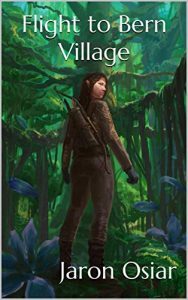 Flight to Bern Village by Jason Osiar:
Flight to Bern Village by Jason Osiar:
While a war rages in space, a revolutionary group of humans, shapeshifters, and telepaths gather to prove their races can live together in peace. They believe in peace enough to erase their memories and begin a primitive city on a secluded planet, Vastus.
Generations later, conflicts on Vastus force people to flee their city. Meanwhile, a few Peace Bringers arrive on a broken-down space station to observe the inhabitants on Vastus. What they see is anything but encouraging, and they must deal with problems of their own. Vastus Station is falling apart, and the relationships between the occupants are equally precarious.
 The Awakening by Dusk Peterson:
The Awakening by Dusk Peterson:
Barrett Boyd has awakened from death to a new and baffling life. He knows that he is a guard in the queendom’s royal prison, the Eternal Dungeon. But why do the prisoners matters so much to him? Who are these other guards who appear to have claims over him? And how will he survive while he finds his new place in this world?
As Barrett seeks to make sense of his surroundings, he must contend with a would-be love-mate, a grumbling rebel, deadly enemies, and the challenge of how to wield his expanded skills.
This suspenseful novel can be read on its own or as the first volume of Dungeon Guards, an alternate history series about nineteenth-century prison workers who seek love and companionship as they fight together against danger.
Dungeon Guards is part of Turn-of-the-Century Toughs, a cycle of alternate history series about disreputable men on the margins of society, and the men and women who love them. Set in the nineteenth and twentieth centuries, as well as in a future that never existed, the novels and stories take place in an alternative version of America that was settled by inhabitants of the Old World in ancient times.
Now the Midcoast nations of this world have reached a turning point: the old order is about to be overthrown. Brought together in friendship and romance by the danger of rising events, the people of the Midcoast nations must learn to adjust to a new world.
Honored six times in the Rainbow Awards for LGBTA literature, Turn-of-the-Century Toughs presents an epic tale of adventure, friendship, romance, and class struggles.
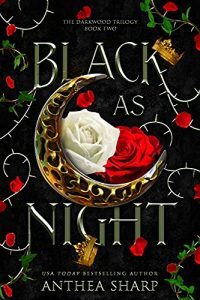 Black As Night by Anthea Sharp:
Black As Night by Anthea Sharp:
One princess. Two realms. And a reckless choice that could destroy kingdoms…
Rose Valrois has escaped the sorcerous red priests and returned to the castle beside the enchanted Darkwood, but her troubles are far from over. Her stepsister, Princess Neeve, is more secretive than ever, and as war threatens, Rose’s mother pushes her toward a political alliance, even as her heart is torn between a heroic prince and the Dark Elf guardian of the forest.
But when Neeve makes a terrible choice, the fate of two kingdoms hangs in the balance. Rose must risk her freedom, her world, and even her heart to save her sister. Can she bear to make that sacrifice? Does she even have the choice?
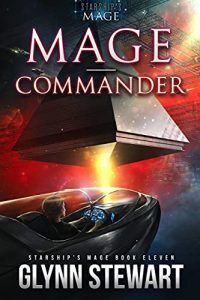 Mage Commander by Glynn Stewart:
Mage Commander by Glynn Stewart:
Some soldiers are the shields of innocent souls
Others are the fanatics of their cause
And for them…no war is ever truly over!
Tempered on the anvil of the war against the secessionist UnArcana Worlds and tested against the evil of Project Orpheus, Mage-Commander Roslyn Chambers has risen through the ranks of the Royal Martian Navy to serve as second-in-command of one of their most prestigious battlecruisers, Duke of Magnificence.
A desperate call for help sends Roslyn and her new ship deep into the frontiers of Protectorate space, where they discover that hold-outs of the UnArcana Worlds’ fleets have returned to plunder innocent ships across the Fringe.
To protect the innocent and serve her Queen, Roslyn Chambers must rise to the task before her. She must learn to command—both herself and a warship of the Mage-Queen of Mars!
 Murder at Magic Lake by Sandra Ulbrich Almazan
Murder at Magic Lake by Sandra Ulbrich Almazan
After losing her job, twenty-nine-year-old Abigail Ritter isn’t looking forward to returning to her hometown of Magic Lake, Wisconsin, for her grandmother’s birthday party. All she has to offer her family is her own special fruit juice and tea blend. But when Grandma suffers a fatal accident in her apartment building, The Grand, Abigail’s cousin Brian is blamed. Abigail will have to step up and investigate with the help of her best friend Sam, an intriguing detective, and a magical stuffed fox named Sherlock. Abigail’s got a plan for the Grand and its shuttered restaurant, but will she solve the case or drown in a sea of suspects?
Getting away from NeuralTech was the easy part.
Staying out of the far-reaching sight of Brenna and the Garden is another matter. It doesn’t help that the Department of Defense is still hunting Jenny Mercado and her man Leo like dogs, and now there is a new mysterious force that threatens to destroy everyone they hold dear.
The very concept of escape is quaint in this brave new world of surveillance, and when their world is brutally shattered, Jenny and Leo must decide whether to keep running, or to find the courage to punch back.
ARMAGARDEN is the thrilling conclusion to the NeuralTech Rising trilogy, and will have readers pondering the nature of memory, and of reality, long after they have read the last page.
 Martian Invasion by James David Victor:
Martian Invasion by James David Victor:
The stakes are escalating and no place in the galaxy seems to be safe, but Earth still has the Breaker Marine on their side.
Holly Cropper and her squad of Marines are finally being recognized for their accomplishments, but not even an awards ceremony is safe. When they are attacked by more of the very robots they just defeated, the entire planet of Mars might become collateral damage. Can Holly and her team track down and destroy all these robots or will they destroy everything on the red planet?
Martian Invasion is the third book in the Star Breaker series. If you like fast-paced space adventures with interesting characters who battle aliens, evil corporations, and space pirates, Holly Cropper and her team of Marines are ready to share their epic adventure with you.
An alien massacre brings the multiverse to war…
When Agent Lawson moves to London, Crane (her known felon boyfriend) is left to raise their child alone.
But as matters send him over the edge, Crane is abducted by aliens.
Now, trillions of galaxies away, the battle rages on, steering death across the stars. Uncanny events occur when Crane is molecularly augmented and shoved into this cosmic war.
 Chrystine’s Sleep Solution by Danielle Williams:
Chrystine’s Sleep Solution by Danielle Williams:
It’s been over a year since insomniac Chrystine Brown got a full night’s rest. So she’s astounded—and relieved—when her new sleep music app puts her in a sound slumber and keeps her there.
But the app’s soothing interface conceals a horrifying secret.
A secret that’s become a part of her.
A secret she may never escape…
* * *
If you’re looking for scares that unnerve instead of nauseate, look no further. Horror stories from Danielle Williams lean towards slow-burn scares and the unsettling. If you take your creeps with a PG-13 sensibility—think The Sixth Sense, The Outer Limits, or The Twilight Zone—this is a story for you.
September 28, 2021
Indie Crime Fiction of the Month for September 2021

Welcome to the latest edition of “Indie Crime Fiction of the Month”.
So what is “Indie Crime Fiction of the Month”? It’s a round-up of crime fiction by indie authors newly published this month, though some August books I missed the last time around snuck in as well. The books are arranged in alphabetical order by author. So far, most links only go to Amazon.com, though I may add other retailers for future editions.
Our new releases cover the broad spectrum of crime fiction. We have hardboiled mysteries, cozy mysteries, historical mysteries, Jazz Age mysteries, WWII mysteries, traditional mysteries, paranormal mysteries, crime thrillers, spy thrillers, psychological thrillers, revenge thrillers, action thrillers, adventure thrillers, historical thrillers, police officers, private investigators, amateur sleuths, FBI agents, ex-CIA agents, spies, reformed thieves, con artists, assassins, organised crime, serial killers, missing persons, stalkers, influencers, real estate fraud, murderous circuses, crime-busting witches, crime-busting socialites, crime-busting journalists, crime-busting ghosts, murder and mayhem in London, New Orleans, Denver, Florida, Wisconsin, Malta, Syria, India and much more.
Don’t forget that Indie Crime Fiction of the Month is also crossposted to the Indie Crime Scene, a group blog which features new release spotlights, guest posts, interviews and link round-ups regarding all things crime fiction several times per week.
As always, I know the authors at least vaguely, but I haven’t read all of the books, so Caveat emptor.
And now on to the books without further ado:
An honest man in a dishonest world.
Detective Inspector Rajiv Sampath still believes he can make a difference.
Fifteen years ago when he joined the Indian Police Service as a fresh recruit, he was full of big ideas and pure ideals about how he could make the world a better place by upholding the law.
Now, after years of working in a world that seems to reward dishonesty and self-interest, he could be forgiven for turning a blind eye.
But he won’t give up.
Follow Inspector Sampath as he does whatever it takes to make sure justice is served… even if sometimes he has to skirt the boundaries of the law.
 Followers by Christina Bergling:
Followers by Christina Bergling:
You never know who is on the other side of the screen.
Sidney, a single mother with a dull day job, has big dreams of becoming a full-time horror reviewer and risqué gore model. Between managing a cellphone store, honoring her soccer mom duties, and wrangling her hostile ex-husband, it seems building her following and interacting with her fans is the only authentic outlet she has—and the validation it gives her is proving to be a little addictive. She’ll overlook her responsibilities for it. She’ll neglect her real-life friendships for it. She’ll even pose nude in bathtubs of blood for it.
If her growing pool of online followers is any indication, her efforts are working, and things are looking good for her Elvira-esque aspirations. Her website is gaining traction, and every day it seems more and more people are sliding into her DMs to chat with her and tell her how amazing she is. In fact, Sidney has so many followers that chatting with them is getting to be a job in itself. More than a job, it might even be getting a little risky….
When Sidney travels to the mountains to attend a horror film festival, she is flattered to find that one of her followers has come to meet her. But he might not be the only one who has gone out of his way to get up close and personal with her. When Sidney is attacked on the way back to her hotel late one night, she learns that real-life horror is not a game, and being stalked isn’t flattering—it’s terrifying, and it could get her killed.
Believing the incident to be a fluke, Sidney decides to forget the attack and focus on her life again. Only this might not be so easy. Because Sidney—and her loved ones—are in serious danger. This stalker isn’t just your average stalker. He knows her every movement, and he knows each step of her routine. In fact, he’s right behind her…and when he gets close enough, he won’t take no for an answer.
Followers is a mystery and thriller with a strong female protagonist that blends women’s fiction with horror.
Proudly represented by Crystal Lake Publishing—Tales from the Darkest Depths.
 Viper’s Nest of Lies by Daniella Bernett:
Viper’s Nest of Lies by Daniella Bernett:
Twice dead… A living nightmare
The discovery of a blood-encrusted stiletto knife in journalist Emmeline Kirby’s bag at Heathrow Airport sets in motion a chain of events that ensnares everyone she holds dear. The body of Sebastian Jardine is soon found in the boot of Superintendent Oliver Burnell’s car, leading to accusations that he and Emmeline conspired to commit murder. Desperate to clear their names, she turns to Philip Acheson of the Foreign Office for help. But when two Special Branch officers arrive to arrest him, he is forced to go on the run.
Gregory Longdon, Emmeline’s husband and a jewel thief/insurance investigator with ties to the criminal classes and MI5, is the only man Philip can trust. Gregory is on his own quest to prove her innocence in a game that makes no sense. Jardine was no stranger. His old friend was a former Interpol agent, who soured on the law and succumbed to his baser instincts. The real problem is Jardine died five years earlier. A fancy pink diamond with a murky provenance that men are willing to kill to possess holds the key to the truth. From London to Malta, Emmeline and Gregory are drawn into a web of corruption and revenge. Will they forfeit their lives for justice?
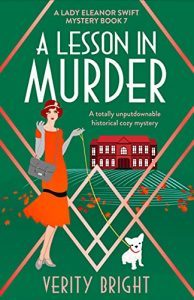 A Lesson in Murder by Verity Bright:
A Lesson in Murder by Verity Bright:
When Lady Swift is invited to her old school, she walks through familiar classrooms, finds her favourite books in the library… and surely that’s not a body? Time for a lesson in murder!
Autumn, 1921. Lady Eleanor Swift is invited to her old school, St Mary’s, as a guest speaker. Her favourite teacher, Mrs Wadsworth, has asked that Eleanor talk about her intrepid travels around the globe – travelling the Silk Road by bicycle, crossing the Himalayas and even befriending the Maharaja of India. But in the circumstances, perhaps it would have been a good idea to talk about her career as a daring detective…
Because no sooner has Eleanor brushed up on her times tables then she is greeted by terrible news: Mrs Wadsworth has been murdered. Eleanor is utterly devastated but she owes it to her dearest teacher to find out who killed her and why. So, alongside Gladstone the bulldog, it’s best paw forward to track down a villain.
But when the art teacher is also found dead, Eleanor is sure someone is trying to do away with the people who taught her everything. As Eleanor delves into possible motives, she discovers a clue in the most unlikely place: her mother’s old school diary. Does the route to the murderer lie within a secret passageway her mother uncovered? Can Eleanor nail the culprit in time or is the killer coming for her next?
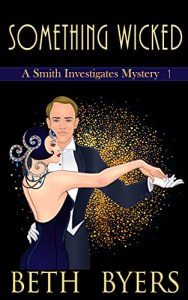 Something Wicked by Beth Byers:
Something Wicked by Beth Byers:
Smith is a man who knows when to say no. He avoids the cases where he’ll never get paid. The cases for which no resolution is possible. And, most of all, the heart-rending cases. The ones that start with the tear-filled eyes of a mother, a sister, or a friend. The ones that haunt a man. The ones that push him to his limits. He says no before he gets pulled in, and he doesn’t look back.
His wife, Beatrice, however, does not. And thus begins the adventure that will push their love to the limits and cause them to risk everything that matters. And this time, they don’t have their friends to help them along the way.
 Florida Sinking by David Crosby:
Florida Sinking by David Crosby:
Water, water everywhere–
Deadlier than you’d think!
In Will Harper’s latest hardboiled, action-packed adventure, Floridian families are shocked–and occasionally killed–when their brand-new houses start falling into the earth. The culprit? Lethal sinkholes worsened by climate change. But government officials and one particularly greedy developer keep turning a blind eye.
And as the homeowners suddenly realize their sinkhole-ridden land is worthless, they’re sometimes driven to homicidal behavior…
Will, a semi-retired investigative reporter turned amateur sleuth, is too big-hearted not to get involved. While researching a hard-hitting expose on climate change and the quality of water in Florida, he discovers the deceitful real estate developer is constructing an entire development on top of a massive sinkhole. Whole neighborhoods could slide into the muck!
The developer will stop at nothing to conceal his intricate fraud, but luckily, Will comes equipped with his ever-sharp prose, his commitment to Florida social issues, his beloved trawler, The Wanderlust, and a little help from his friends.
Still, the shoddy real estate cartel’s a behemoth— fortunately for the reader, it won’t be easy!
 Beyond Sacrifice by Alicia Dill:
Beyond Sacrifice by Alicia Dill:
Concepcion Chapa, an Army veteran, FBI special agent, and the orphaned daughter of two CIA agents, has lived a life of sacrifice for her country. When she learns that her parents may not be dead, just undercover, she allows herself to be recruited as a killer-for-hire for the CIA. Faking her death and undergoing surgery to change her looks, Concepcion leaves everything behind-her friends, family, and country. Under the identity of Sofia Paltrini, she travels the globe doing the dirty work of the US government. But in a world of subterfuge and hidden motives, no one is quite who they seem. Concepcion is left not knowing who to trust and wondering if there’s a way to live a life for herself that’s beyond sacrifice.
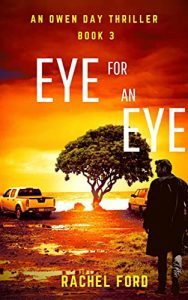 Eye for an Eye by Rachel Ford:
Eye for an Eye by Rachel Ford:
First mistake: they kidnapped his niece and nephew.
Second mistake: they didn’t kill him when they had the chance.
Now, they’re going to rue the day they were born.
Former Army intelligence analyst Owen Day is on vacation in Random Lake, Wisconsin with his niece and nephew. It was supposed to be a quiet getaway.
But sometimes the best place to hide is in plain sight. When Owen crosses paths with a band of dangerous fugitives posing as tourists, his family becomes a target.
When they take his niece hostage in a desperate endgame, there’s only one way to ensure her safety: find the fugitives, and eliminate them. Down to the last man.
 Ghostly Endeavour by Lily Harper Hart:
Ghostly Endeavour by Lily Harper Hart:
Harper Harlow is ready to move forward with her business, which just so happens to include taking ownership of the beleaguered Whisper Cove Cemetery. She and her partner Zander Pritchett have big plans … until the day they close on the property and discover a body on one of the well-worn pathways.
Cassie Clifton is recently divorced, a devoted runner, and an individual with a lot of secrets. She was estranged from her parents before her death and apparently desperate to get out of town. Why, though? Harper is determined to figure answers, no matter how hard she has to dig.
Harper’s husband Jared Monroe is on the case but the proximity of death to his new wife has him spinning. It was supposed to be a fun business endeavor, a way for Harper to continue running her cemetery tours without oversight. It’s turned into so much more.
Harper and Jared join together, and when they uncover ties between Cassie and one of their closest friends, they’re thrown for a loop. Have they embedded themselves with a killer?
It’s a race to the finish to find Cassie’s murderer and bolster Harper’s new business in the process. It’s going to take everything they have – every member of their motley crew of friends working together – to cross the finish line safely.
Death is stalking Whisper Cove again. Will they all survive to see another day?
 A Crone to Pick by Amanda M. Lee:
A Crone to Pick by Amanda M. Lee:
Scout Randall knows what she is, more than a witch, more powerful than she ever thought imaginable. She’s only hit the tip of the iceberg on what she can do. Now she has to grapple with another problem.
When her former partner Evan was believed dead in a vampire attack, she blamed herself, mourned, and tried to move on. Now he’s back, and he’s more than anybody ever imagined, too. Unfortunately, nobody can find him.
When news reaches Scout that there’s been a potential vampire attack in neighboring Hemlock Cove, she packs her bags and hits the parnormal tourist destination with her boyfriend Gunner as backup. She’s not prepared for what she finds, including a gaggle of witches who like to cause trouble wherever they go.
Evan is there, lurking in the shadows and struggling with an identity he didn’t ask for, but death is stalking the town from multiple directions. Murder, mayhem, and monsters are afoot and Scout is determined to get to the bottom of it all … even if her life is in danger in the process.
The baddest motorcycle gang in the Midwest is about to meet the Winchester witches. The world will never be the same.
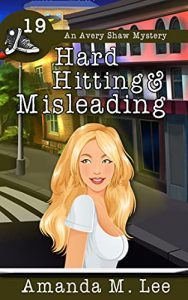 Hard Hitting and Misleading by Amanda M. Lee:
Hard Hitting and Misleading by Amanda M. Lee:
Avery Shaw is back from her honeymoon and on the prowl for a story. She wants to prove that marriage hasn’t softened her – nothing ever could – and the way she’s going to do that is by rocking the news world with something monumental.
Then a body drops in her neighborhood, only blocks away from her house, and the hunt is on.
The victim is divorced, having an affair with a married co-worker, and generally unlikable. Avery has multiple places to look for a suspect … and then another woman dies only a block away from Avery’s house and the entire dynamic of the story changes.
Avery’s new husband Eliot is worried, enough so that he taps Sheriff Jake Farrell to help. Avery’s anger with Jake hasn’t diminished but now they’re working as a group to track down a deadly killer.
Avery doesn’t want help but she needs it, because someone is watching her house and, more importantly, her. Eliot is beside himself and begins upgrading their security system but it doesn’t feel like enough.
Avery is supposed to cover the news, not become part of it. This time the headline that’s coming for her includes the word “victim,” however, and she’s having none of it.
She’s a strong, capable woman, and if she has to take down a serial killer, she’s going to do it … as long as she’s not taken down first.
Her team is large and in charge and it’s going to take all of them working together. Even then, they may not be strong enough to stem the tide of death washing over Macomb County.
It’s time. Avery is ready for war.
Cutter Grogan came to Syria to search for a missing woman.
He found old enemies who greeted him with violence
A missing woman in the Middle East isn’t the assignment Cutter would take on, but when an old client makes the request, he can’t refuse.
Samira Latif’s disappearance is shrouded in darkness. His client doesn’t have much information for him. The missing woman’s connection to one of the most powerful people in the US remains unexplained.
On arriving in Syria, he finds everything he was told was a lie. His old enemies haven’t forgotten him and have laid out a welcome.
Was he set up from the start?
 The Girl in the Woods by A.J. Rivers:
The Girl in the Woods by A.J. Rivers:
I’m all alone now… But I just have to make it there.
I need to keep going… Keep…
A beautiful woman’s body is found frozen on the ground.
And many questions that no one can answer arises.
When Emma Griffin joined the FBI, she had hopes that she could find out the truth about her own past. But over time she realized that it was more than just herself. She wanted to be a voice for the victims. To bring justice for those that are no longer with us. To rid this world of evil doers, hunt down those who destroyed lives, and be the voice for the voiceless.
But what happens when she’s asked to help someone who not only inflicted unbearable pain to her life, but to the lives of many?
After Emma’s wedding is disrupted by a phone call from a voice from the past that starts her on a new chase, she’s forced to face one of the most difficult decisions of her career.
Would you exonerate a killer in the search for truth and justice?
Only Emma can put the clues together.
Could she clear the name of the man she loathes, or will all clues lead back to him?
Truth has consequences.
And the big bad is back and this honeymoon is coming to an end…
 Deliver Us From Darkness by L.T. Ryan:
Deliver Us From Darkness by L.T. Ryan:
An unexpected clue in his son’s disappearance leads Mitch Tanner to Denver. But there are forces at work who will stop at nothing to send Tanner – and his son – home in a body bag.
When Tanner’s search for his son leads him to Denver, Colorado, an old friend is ready to help out. But things go sideways when Bridget Dinapoli is assigned a similar case. Nothing is as it seems as Tanner and Bridget race to stop a suspect. But when the trail goes cold, they find themselves being pulled into something much more sinister. It will take everything they have to save Tanner’s son, and themselves.
It’s February 1942. War grips the world. Asian hate runs rampant, and New Orleans is a dangerous place for Chinese-English scientist Thomas Ling as he collides with self-proclaimed psychic Beatrix Patterson. She’s a good liar with an excellent memory, which in truth is her only gift—well, that and conning the well-heeled out of their money and secrets.
Hired by the US Army to use her connections to expose Nazi saboteurs and sympathizers, Beatrix recruits the reluctant Thomas. Together, they pit their skills against a government conspiracy, terrorist cells, kidnappings, and murderous plots. As Beatrix grapples with the truth of her own past, she must come to terms with her ruse. Exposing the Nazi war machine about to invade the country could cost Beatrix everything she’s worked so hard to build. But the information she and Thomas uncover could change the outcome of the war.
The question remains: will anyone believe a liar and a suspected traitor?
 Murder on Mallowan Court by Lee Strauss:
Murder on Mallowan Court by Lee Strauss:
Murder’s afoot!
As Mrs. Ginger Reed~also known as Lady Gold~waits impatiently for the coming of her baby, new neighbours move onto Mallowan Court. The Foote family is very much like Ginger’s own, if not the mirror opposite: Mr. and Mrs. Foote an unhappy couple; Mr. Rothwell an aging, irate patriarch; Miss Charlotte, whom Scout finds to be a tantalizing, if confusing specimen of young ladyhood; along with a similar collection of staff.
The sudden passing of a Foote family member is determined to be unsuspicious, but something about this strange family doesn’t sit right with Ginger.
When the doctor banishes Ginger to her bed to await the coming birth, she has to depend on the information brought to her by her good friend and former sister-in-law, Felicia.
Can the two ladies solve the crime before the baby comes?
 Murder at Magic Lake by Sandra Ulbrich Almazan
Murder at Magic Lake by Sandra Ulbrich Almazan
After losing her job, twenty-nine-year-old Abigail Ritter isn’t looking forward to returning to her hometown of Magic Lake, Wisconsin, for her grandmother’s birthday party. All she has to offer her family is her own special fruit juice and tea blend. But when Grandma suffers a fatal accident in her apartment building, The Grand, Abigail’s cousin Brian is blamed. Abigail will have to step up and investigate with the help of her best friend Sam, an intriguing detective, and a magical stuffed fox named Sherlock. Abigail’s got a plan for the Grand and its shuttered restaurant, but will she solve the case or drown in a sea of suspects?
 Pineapple Circus by Amy Vasant:
Pineapple Circus by Amy Vasant:
Now in the center ring… murder!
Newly-minted private detective Charlotte Morgan, resident orphan of the Pineapple Port 55+ community, discovers she might not be an orphan after all. Stunned by the news, she distracts herself with a cat burglar who left a smear of make-upped whiskers on a sliding glass door, and a path straight to “Clown Town” a retirement community for retired circus performers. When a fortune-teller doesn’t see her own death in the cards, Charlotte’s burglary becomes a murder investigation!
Charlotte’s neighborhood moms, Mariska and Darla, can’t help with this one. They’re busy infiltrating an underground golf cart racing ring, led by a shady operator and her toady sidekick…
When another circus performer falls victim to the Big Top Killer and Stephanie goes missing, Charlotte finds herself walking a highwire of danger…this killer isn’t clowning around!
Cora Goes to the Virtual 2021 Octocon
Octocon is the Irish national science fiction convention, which normally takes place every October in Dublin, Republic of Ireland. However, as you may have noticed, 2021 is not a normal year and therefore Octocon is virtual this year. Which means that I can attend.
The virtual 2021 Octocon takes place from October 1 to 3. Registration is free, though donations are encouraged.
The full program is here and I encourage you to check it out, because there is a lot of great content.
You can find me on the following panels:
Saturday, October 2, 11:00 Irish Summer Time (UST+1): Around the World in 80 Pictures
Sakuya (moderator), Cora Buhlert, Ann Gry, Christopher Hwang
Whether you call them bandes dessinées, historietas, fumetti, manga or comics, stories told by pictures in a sequence have a long history and a global appeal. Regional traditions can influence each other through publishing styles and cultural ideas, and in this panel we’ll take a sightseeing tour through the shared history of comics.
Saturday, October 2, 15:00 Irish Summer Time (UST+1): The Fantasy Genre Before Lord of the Rings
Elaine McIonyn (moderator), Cora Buhlert, Jack Fennell, Dr Helen Conrad-O’Briain
Tolkien popularised fantasy set in a fully realised secondary world with no direct link to our own. Yet there were authors working before The Lord of the Rings came to rule the demesne, including E.R. Eddison, Robert E. Howard and our own Lord Dunsany, whose books go in strange directions separate from those of Tolkien and his imitators. Join our panellists as they explore the work of these early fantasy writers.
Sunday, October 3, 15:00 Irish Summer Time (UST+1): Uncovering the Hidden Treasures of the Past
Ian Moore (moderator), Deirdre Thornton, Cora Buhlert, Michael Carroll, Cheryl Morgan
Science fiction as a genre looks to the future, but authors of the past can still have a lot to say to us even though their work may have fallen out of print and become a distant memory. Why have some writers and works been consigned to the vaults of history while others have remained on the shelves, and what would our panel most like to see restored from the archives?
So what are you waiting for? Register and join us at Octocon. It’s going to be a lot of fun.
September 27, 2021
Foundation is “Preparing to Live” and deviates from the books a lot
I’m still not sure, if this will be an ongoing series of episode by episode reviews, but I did watch the second episode of Foundation on this shit show of an election night. Reviews of previous episodes (well, just one so far) as well as two actual Foundation stories may be found here BTW.
But before we get to Foundation, I wanted to let you know that I’m over at Galactic Journey again today for a joint article in appreciation of Cele Goldsmith Lalli, editor of Amazing Stories and Fantastic from 1958 to 1965 and editor of Modern Bride for a long time thereafter.
My colleague John Boston, Galactic Journey‘s resident Amazing reviewer, focusses on Cele Goldsmith Lalli’s career at Ziff-Davis Magazines in general and how she turned around the fortunes of that old warhorse Amazing and its younger cousin Fantastic. My half of the article focusses specifically on Cele Goldsmith Lalli’s role in bringing about the sword and sorcery revival of the 1960s, because she published sword and sorcery in Fantastic, when no one else would. Cele Goldsmith Lalli also rescued Fritz Leiber’s Fafhrd and the Gray Mouser from oblivion, introduced John Jakes’ Brak the Barbarian and Roger Zelazny’s (Zelazny was one of several authors Cele Goldsmith Lalli discovered) Dilvish the Damned and even published one of Michael Moorcock’s Elric stories.
So in short, Cele Goldsmith Lalli was a highly influential editor and one who should be better remembered.
And now on to the second episode of Foundation, which has nothing whatsoever to do with the books, largely because it covers a period of time that the book skips over, namely the long journey of those who will eventually become the Foundation to Terminus. In the book, the story only starts up again 35 years after the Foundation settles on Terminus and skips the trip there as well as the early pioneer years.
Since episode 2 covers ground that the book doesn’t, writers Josh Friedman and David S. Goyer have a lot of liberty regarding what to do. Mostly, they use this liberty wisely – except for one baffling and utterly infuriating decision near the end of the episode.
Warning. Spoilers beyond the cut!
The episode follows two different narrative strands. One is the journey of the Foundation members to Terminus, the other the investigation who is behind the terrorist attack on Trantor’s space elevator in the last episode.
On Trantor, the Imperial Triumvirate and their aide Demerzel are still trying to figure out who is behind the terrorist attack on the space elevator, which left 100 million people dead. And so the episode opens with Demerzel overseeing the torture of a woman who runs an illegal biohacking lab and implanted the bombs into the terrorists. However, the clues don’t lead anywhere.
The most likely suspects are the delegations from the rim kingdoms of Anacreon and Thesbis, since the terrorists sang a hunting song and said a prayer in their respective languages. However, in endless interrogations, the heads of the delegations keep claiming that they’re innocent and know nothing.
Brother Day doesn’t believe them. Brother Dusk does, but also knows that they will be executed for the crime anyway, because a culprit is needed and who cares if it’s the right one. Young Brother Dawn just finds the whole thing deeply disturbing.
There’s also a subplot that Brother Dusk finds his health declining. He heads to the destroyed sections of Trantor and goes to see a priest of the religious fanatics of Synnax, who of course survived the attack. Brother Dusk wants to know if the priest can foresee the future and if Gaal Dornick can, but gets no satisfying answers.
While Brother Dusk goes to see the priest, parts of the unstable ruins collapse. Brother Dusk is unhurt, but Demerzel is hit in the shoulder by a fragment, which leads to repair scene which reveals that she is a robot. We also learn that the Emperors know what Demerzel is as well as a bit about the “robot wars”, which ended with the humans destroying all robots not named Demerzel a.k.a. Daneel.
Unless it turns out that the robots were innocently persecuted, this moment is a bit eye-rolly, because a robot uprising is not possible in Asimov’s universe due to a little thing known as the Three Laws of Robotics.
If I hadn’t read the books, I would assume that the most likely culprit for the terrorist attack (because the fall guys from Anacreon and Thesbis clearly didn’t do it) is Demerzel herself, probably to get revenge for the robot wars. At any rate, all signs point at her. Though I really hope they won’t go that route, because it would completely undermine Daneel’s character.
Meanwhile, Brother Day decides to channel his inner Ronan the Accuser (who is of course Lee Pace’s other great space opera role) and mete out Imperial justice on Anacreon and Thesbis who are deemed responsible for the attack, even though they most likely are not. And so he stages a public execution for the edification of the public on the site where the stalk of the space elevator hit Trantor.
First, Brother Day has both Thesbis and Anacreon bombed in retaliation for the terrorist attacks and forces the delegates to watch a holographic projection of the bombings. Because bombing random planets is absolutely the way to go when you want to prevent your Galactic Empire from falling apart. Never mind that Anacreon and Thesbis are still needed for future installments, so don’t bomb them too much. Also, I wonder what impact the bombing of Anacreon and Thesbis will have on future developments. Is the reason that Anacreon and Thesbis no longer have Imperial technology (cause I’m pretty sure they won’t go with nuclear power in the series, cause that bit was outdated even by the time I first read the books in the late 1980s post-Chernobyl) by the time of “The Encyclopedists” and “The Mayors” that they had the shit bombed out of them?
After the bombings, Brother Day has all members of the two delegations except for the two leaders hanged in the ruins of Trantor. The twitching bodies of the sworn enemies hanged side by side certainly makes for a great spectacle, however, the whole thing feels off. Because whenever someone is threatened with execution in Foundation or any other Asimov science fiction story, the execution method is either the gas chamber, as in “The Wedge”, or lethal injection, a fate that Hari Seldon himself and Dors Venabili narrowly escape, when the violate the taboos of some religious fanatics in Prelude to Foundation. This pattern is very notable. In Asimov’s work, executions – when mentioned – are always by gas chamber or lethal injection. I suspect it’s because Asimov was a chemist and probably felt those were the best methods to kill people.
But of course, gas chambers or lethal injection are not nearly as photogenic as people kicked from some kind of concrete platform and twitching and kicking at the end of a rope, while the citizens of Trantor applaud. As deviations go, it’s also fairly minor.
Brother Dawn is not a fan of public executions, so Demerzel assures him that being Emperor won’t require making such decisions all the time, that most of the time there are no public executions. “How often do we have to do this?” a disturbed Brother Dawn asks. “You do this every single time”, Demerzel replies, which sure sounds ominous.
The 9/11 parallels in the Trantor scene are very notable, from the shots of the ruined city to Brother Dusk declaring that he can smell and taste the ashes of the dead – something that residents of Lower Manhattan reported after 9/11. And of course there are the retaliatory attacks on two random planets/countries, which are not actually responsible, but look guilty enough.
9/11 parallels have become a lot less common compared to the early 2000s, when every science fiction show on the air had to have one. The new Battlestar Galactica and Star Trek Enterprise are probably the worst culprits. Is a blatant 9/11 analogue appropriate for Foundation? Well, Isaac Asimov was a near lifelong New Yorker, though he was actually born Petrovichi, then Soviet Union, and emigrated to the US with his family at the age of 3. Had Asimov lived longer (he died in 1992 of AIDS, having contracted HIV from a blood transfusion in 1983), he might well have experienced the September 11, 2001 attacks. He would have been 81 then and he would certainly have had opinions. So I don’t think that Asimov would have objected to the 9/11 parallels in the show, even though they’re not in the book for obvious reasons.
In general, the Trantor scenes are interesting and visually impressive, though they have next to nothing to do with the books. We already know that Lee Pace is good at playing Galactic tyrants and his Brother Day is a step up from Ronan the Accuser, because Pace manages to find the balance between his harsh public persona and the private persona which shows tenderness towards Brother Dusk and particularly young Brother Dawn, who are the only real family he has. Laura Birn will never be my idea of Daneel, but her take on Demerzel is quietly sinister.
The whole clone dynasty plot still feels as if it wandered in from a completely different book. But the idea of a perpetual dynasty of white male rulers who are all the same person and manage to reproduce without any women at all is a very golden age science fiction thing. I suspect John W. Campbell would have approved as would teenaged Isaac Asimov who wrote outraged letters to the science fiction magazine of the 1930s that he wanted no women in his SF, thank you very much. Adult Asimov was quite embarrassed by those letters.
The other plot strand follows the colonists who will one day become the Foundation on their multi-year (because the Empire wouldn’t give them a jump ship) trip to Terminus. In the books, the original settlers of Terminus are a bunch of nerds who want to assemble the greatest encyclopaedia of all time. In true 1940s style, no attention is paid to how those nerds will keep warm, where the power comes from, who’ll cook their meals and wash their clothes and how they’ll survive on an inhospitable planet.
The series attempts to remedy that and shows us the laundry workers of the Foundation, the guards of the Foundation (who barely know where to aim their rifles), the reproduction medtechs of the Foundation and the miners of the Foundation. In general, this is a good thing. That said, the fact that many, if not most of the people aboard that ship are not nerdy encyclopedists but regularly folks makes Hari Seldon seem even more like a sinister cult leader leading his followers to the promised land of Jonestown Terminus. Now the fact that the Foundation does come across like a fanatic cult is something that even comes across in the original stories, as I noted in my review of “The Wedge”. It’s even more apparent in the series, especially since according to calculations, more than thirty percent of the colonists will die within a few years. “Well, at least the percentage is dropping”, Hari Seldon exclaims with inappropriate cheer.
Because the colonists have a lot of time on the ship, they occupy themselves by using the holodeck to train for all sorts of work someone will have to do while on Terminus. And so we are treated to a simulation where a group of nerds cosplaying as miners are attacked by a monster called “Bishop’s claw” and all die. That scene is probably supposed to inject some action into the otherwise quite talky shipboard scene, but it also made me grit my teeth, because there are no aliens in Foundation and in Asimov’s science fiction in general. And while the Bishop’s Claw is just a random monster and not intelligent, it still doesn’t fit here, because unlike the Star Wars universe, Foundation is not set in a universe where every random cave is inhabited by a monster. Nor do I think Asimov would have approved since he was not a fan of the bug-eyed monsters of early science fiction.
When the colonists are not playing simulations or sitting in meetings about the encyclopaedia (nice moment where Gaal points out that the worlds of the Empire can’t even decide on a unified number system), they do what a lot of humans cooped up on a cramped spaceships over long period of time do – they fall in love, have relationships and have sex.
The latter is a problem – no, not because John W. Campbell’s editorial assistant Kay Tarrant is lurking somewhere in the background, eager to exercise any hint of impropriety from the stories published in Astounding/Analog – but because a baby boom on a spaceship with limited resources is not a good idea. Never mind that the radiation of deep space may harm fetuses. And so the reproductive medtechs of the Foundation extract eggs and embryos from female members of the Foundation to freeze them for later use. This seems like a sensible policy, until one of Gaal’s friends manages to get pregnant from a one-night stand and decides that she wants to have the baby now, because who knows if she’ll survive Terminus. Gaal tries to talk her out of it and apparently succeeds, because the next time we see the young woman in question, she’s drinking wine, hinting that she is no longer pregnant.
Meanwhile – to the surprise of no one except Hari Seldon who can be mightily blind for someone who can calculate the future – Gaal Dornick and Seldon’s adopted son Raych end up in a relationship. There are two sex scenes, which will satisfy the folks who want Foundation to be more like Game of Thrones* and which will make Kay Tarrant rotate in her grave. Gaal and Raych also talk of building a cabin together and having kids, once they reach Terminus.
This sounds so nice and idyllic that something has to go wrong and so of course, something does. Because Hari Seldon, it turns out, is not at all happy about the relationship between Raych and Gaal. It’s not quite sure why, because he’s clearly fond of both Raych and Gaal. Gaal suggests that Hari might be jealous and indeed, that’s a possibility, because some of the looks Hari gives Gaal are not very paternal. Not to mention that Hari watching her swim (and Gaal swims a lot in the ship’s swimming pool) is kind of creepy. Honestly, I’d hoped that we would leabe Asimov’s occasionally dirty old man moments to the books, especially since this one never even happened in the books?
Raych, meanwhile, claims that Seldon doesn’t like relationships in general, because he believes they distract people from what is important, namely the plan. Now there are Asimov characters who really do view relationships as an unnecessary distraction – Susan Calvin is the most notable example and my teenaged self loved her for it.
However, Hari Seldon is never portrayed as anti-relationship anywhere in the books. Book Hari marries Dors Venabili and adopts Raych. And book Raych is married as well and has a daughter called Wanda. Hari Seldon is very fond of his granddaughter. In the books, Hari Seldon clearly has no problem with people, including people close to him, having relationships.
TV Hari, however, is not at all pleased that Raych and Gaal are in a relationship and so he behaves like a jerk and publicly recounts the story of how he caught young Raych trying to steal books to support his alcoholic father, which clearly embarrasses Raych.
Raych is understandably pissed off, but nothing about the exchange seems like more than a regular parent-child argument. And indeed, Raych ensures Gaal that they have this same argument every two years or so.
However, the next time Gaal goes swimming and counting prime numbers in the ship’s pool (which for some reason is always empty when she’s in there), she has a premonition that something awful is going to happen. And come to think of it, Gaal also claimed that something was wrong with the space elevator moments before it exploded. So is Gaal a precog? Psionics do exist in the Foundation universe (well, the stories were published in John W. Campbell’s Astounding, so of course psionics are a thing), though only as telepathy. They also don’t show up until book 2, when they do so in an explosive fashion.
At any rate, a spooked Gaal clambers out of the pool and races to Hari Seldon’s quarters, where she finds Hari bleeding out on the floor with a stab wound in his chest, while Raych is standing over him with a knife in his hand. And yes, the knife is Raych’s – since we see him with it in the first episode.
So Raych Seldon has just murdered his adoptive father because of what’s essentially an argument over a girl. I’m sorry, but what the fuck…? This not only doesn’t happen in the books, it also makes zero sense. Though at least I now know which scene so infuriated Rob Bricken of io9 that he wanted to tear his TV to pieces. And yes, I sympathise.
For starters, Hari and Raych are fond of each other. They are fond of each other in the books and in the TV show, until Hari randomly decides to be a jerk because of reasons. And yes, Hari Seldon never reaches Terminus. The books imply that he died of old age and indeed, book Hari is a lot older – in his 80s or even 90s – than TV Hari, who is played by 60-year-old Jared Harris. And while it’s possible that book Hari did get murdered after all, he certainly wasn’t killed by Raych, since Raych is dead at that point. Also, if Hari gets murdered by the end of episode 2, will he have enough time to record all of those holographic pronouncements which will enliven the rest of the series?
Once Gaal stumbles upon Raych standing over the body of his father, a bloody knife in his hand, Raych grabs her and drags her to the nearest escape pod (amazingly, no one even tries to stop them, even though they’re on a packed colony ship), shoves her in, puts her in suspended animation and shoots her out into an asteroid field, because of reasons. Honestly, the only explanation for Raych’s behaviour is that he had a sudden psychotic break.
From a narrative POV, I can see why they would put Gaal in suspended animation, so they can keep the character around longer than she would normally be. As for killing off Hari, murder at the hand of his adoptive son makes for a more dramatic cliffhanger than dying in bed of old age. But it still doesn’t fit the spirit of the books at all. The Foundation people are nerdy encyclopedists, not killers. Not to mention that the Foundation has just lost the only two people capable of understanding and interpreting the Seldon plan. Luckily, all the real work is done by the Second Foundation back on Trantor.
It seems to me as if the producers are scared of making Foundation the way it should be made, as a series of largely self-contained stories with a completely different cast each episode or two and Hari Seldon and maybe the Emperors Three as the only continuing characters. Personally, I think that people would watch that – after all, people are happily watching anthology shows like Black Mirror, Love, Death + Robots, Philip K. Dick’s Electric Dreams and all of those American Something or Other Story shows. Because audiences in general are smarter than Hollywood producers give them credit for. And the fact that the Foundation series has been read and enjoyed by countless people who had zero issues with its episodic structure shows that audiences have no problem with this format. Just as they have no problem accepting that Foundation is not an action packed story. It does have cliffhangers – several in fact – but they’re usually a character saying “Now I have the solution” or the memorable “Stars in heaven, now I know” and not bloody murders.
Of course, there currently is a flurry of comments on Twitter by people who not only bounced hard off Foundation, when they tried to read it, but who also seem to be personally offended by the existence of the books and their continuing popularity, which they view as an attempt to exclude them personally from the genre for not liking Foundation.
Now I have no problem with people not liking Foundation. There are plenty of beloved books I don’t care for. I also have no problem with people whose gateway into the genre was not Foundation or another SF classic such as Heinlein’s juveniles, but something completely different. There are as many gateways into the genre as there are fans and all of them are valid.
However, what annoys me is the standard narrative of a budding female fan who is urged to read Foundation by a male relative, bounces hard off the books, because they are so sterile, male, white and sexist and decides that science fiction is not for her. Until she chances to read Ursula K. Le Guin (or maybe Octavia Butler, but mostly Le Guin) and realises that science fiction does not have to be stale and male and sterile. Therefore, Foundation is bad and the only people who like it are old white man.
Now I was a budding female fan, when I found Asimov and Foundation during a long stopover at Athens airport in the late 1980s. No one handed the books to me – my parents didn’t read SF – I found them on my own, because it was the only science fiction novel in the spinner rack at the airport bookstore. Nor was Foundation the first SF book I read. I’d read Star Wars novelisations and Anne McCaffrey before and of course, I’d loved plenty of media science fiction. However, Foundation literally blew my mind. It blew my mind so much that I forgot the stuffy airport with the broken air conditioning system or the fact that I had a shitty aisle seat on the plane, next to some woman who kept drinking hard alcohol and just behind the curtain that separated business class an economy, a curtain that the flight attendant would always sweep into my face, while passing. Because the book was just so good. It was so good that I ran out and bought everything by Asimov I could get my hands on except for his non-fiction and the Black Widowers mysteries.
The fact that there were so few women in Foundation didn’t bother me, probably because I read Prelude to Foundation first, which does have female characters. The whiteness did not register, because Asimov hardly ever describes his characters anyway and I never viewed all of them as white. The fact that the characters are cardboard didn’t bother me either, though in retrospect a lot of what I thought I remembered about the characters only existed in my head, so my imagination supplied what Asimov did not. And the sterility, i.e. the relative unimportance of romantic relationships and yes, sex, was actually a plus, because sixteen-year-old Cora was not particularly interested in reading about romance and not at all interested in reading about sex.
As I said above, everybody’s gateway into the genre is different. And while Foundation wasn’t the gateway for me – that honour belongs to Star Wars, Star Trek, Raumpatrouille Orion and the Captain Future anime – the books were very important to me once. And yes, I accept that many people don’t like them, but please don’t dismiss my experience as someone to whom those books once meant a lot.
After discovering Foundation, I read a lot of SF, mostly classics from the 1940s and 1950s, which were still readily available in print at the time. And yes, I also discovered Ursula K. Le Guin (The Word for World is Forest was the first one I read) and enjoyed her work. But it doesn’t hold the same importance for me that Asimov’s work does.
Back to episode 2 of Foundation, Camestros Felapton also reviewed the episode and seems to enjoy it. Though I agree with him that while Foundation the show is entertaining enough, it’s not quite must-see TV nor compelling drama. And at least the second episode is also not the Foundation that blew my mind more than thirty years ago.
I will watch and probably review the next episode, but the final judgment is still out.
*The constant comparisons between Foundation and Game of Thrones are something I really don’t get, because both series have nothing in common apart from being both part of the large SFF genre. However, no one would think to compare NCIS and Grey’s Anatomy, even though they’re both set in the contemporary US, because both shows are completely different animals which do different things and appeal to different audiences. So why must Foundation or indeed any other new SFF show inevitably be the next Game of Thrones? Why can’t it just be its own thing?
September 25, 2021
Foundation enjoys “The Emperor’s Peace” and turns out better than expected
Before we get to the meat of the post, I’d like to point you to my latest article over at Galactic Journey, where I review the first episode of the classic West German science fiction TV series Raumpatrouille Orion, which debuted in September 1966, only nine days after Star Trek. I will be reviewing the remaining episodes of Raumpatrouille Orion as well, so stay tuned.
Getting to do episode by episode reviews of Orion, while pretending to be a viewer in 1966 who’s never seen the show before, is something something I’ve been looking forward a long time now.
By contrast, the adaptation of Isaac Asimov’s classic Foundation series was something I was less looking forward to than dreading. Now you have to know that Asimov’s work in general and Foundation in particular were very, very important to me as a budding teenaged science fiction fan. They blew my mind and were my favourite books at the time. So a bad adaptation of Foundation would hurt me in a way that e.g. the shitty Earthsea adaption of the 2000s or the terrible Sci-Fi Channel Dune miniseries didn’t.
And I had good reason to fear that Foundation would be terrible, because Asimov adaptations have traditionally always been terrible and Foundation is probably the most difficult of his works to adapt. If you want to adapt Asimov, an Elijah Bailey/R. Daneel Olivaw police procedural would be the way to go (and in fact I’m surprised that no one ever made one) or maybe Powell, Donovan and Calvin: Robot Trouble Shooters, starring David Tennant as Mike Donovan, Adrian Lester as Gregory Powell and Cate Blanchett as Susan Calvin. Hey, I can dream, can I?
But Foundation? Yes, my 16-year-old self would have killed for a Foundation TV show and indeed she is the reason I watched and reviewed it, because she would not forgive me. But my 48-year-old self says, “Ahem, better leave that one alone and film something that’s easier to adapt and also more suited to modern sensibilities.” Because Foundation is less a novel or several, but a series of interconnected short stories from the 1940s, which span a period of 500 years and have no continuing characters except for Hari Seldon’s wisdom dispensing hologram (and Daneel, if you want to include him). Worse, the characters that make up the cast of the individual stories are rather underdeveloped and not particularly memorable. Also, the first five stories, which make up the first book, are a little dull, heavy on the talking and low on action. All the really exciting stuff, which will leave you at the edge of your seat with your jaw dropping open, happens in books 2 and 3. So in short, Foundation is extremely difficult to adapt, probably impossible, if you take Hollywood’s insistence that their audiences are stupid into account.
But no one wants my opinion and so, after decades of trying, Apple has finally adapted Foundation series for its streaming service. This was another reason for caution, because though Apple’s streaming service throws a whole lot of money at “prestige” shows, hardly anybody really seems to watch those or care – except for that one weird sitcom starring the “Shame, Shame” woman from Game of Thrones and a guy in a track suit, which has won every Emmy in existence this year. As for their other shows, the most popular one seems to be For All Mankind, a US-aggrandizing space race alternate history which I have zero interest in. There’s also a post-apocalyptic show starring Jason Momoa as a badass blind fighter which sounds great in theory, but which no one seems to watch in practice, and something called The Morning Show which starrs Jennifer Aniston and is advertised all over the place. Those ads make me actively angry, because apparently advertisers believe that just because I’m a woman, I will be interested in a workplace show starring Jennifer Aniston. Advertise Foundation to me or the Jason Momoa show or even For All Mankind, cause I might actually watch those. I will never watch a workplace show starring Jennifer Aniston.
Early reviews for Foundation were also not exactly encouraging either. Leaving aside the nonsense ones from mainstream reviewers who neither like nor get SF and probably should be watching that Jennifer Aniston show, the reviews by critics who actually like SF were mixed. Those who have not read the books generally seemed to like it. Those who have read the books were a lot more divided. Some seemed to like it, some say it’s not as terrible as they had feared and some disliked it such as Steve Davidson of Amazing Stories and Rob Bricken of io9, whose review probably has my favourite headline of them all: “They Said Foundation Couldn’t Be Filmed and It Still Hasn’t Been.”
I expected to find myself agreeing with Steve Davidson or Rob Bricken, who disliked it, but instead I found myself in agreement with Camestros Felapton and Ben Lindbergh of The Ringer, who was positively surprised that Foundation was not as terrible as he had feared.
However, “not as terrible as I feared” does not necessarily mean “good”. So let’s see how “The Emperor’s Peace”, the first episode of Foundation, holds up.
Warning: Spoilers beyond this point!
“The Emperor’s Peace” follows the plot of “The Psychohistorians”, the first story in the first Foundation book, which was specifically written as an introduction for the publication of the book version in 1951. Now “The Psychohistorians” is short, only thirty pages in the 1983 Panther Books paperback edition that I have. It follows Gaal Dornick, a math prodigy from the backwater planet of Synnax, who arrives in the Imperial capital of Trantor to work with star mathematician and creator of the science of psychohistory Hari Seldon. Gaal wanders around Trantor a bit to take in the sights, meets a random traveller named Jerril who turns out to be a spy and winds up getting embroiled in the conflict between Seldon and the authorities of the Galactic Empire, who find his gloom and doom predictions disruptive. When Gaal Dornick refuses to refute Seldon’s theories, Seldon and Dornick are put on trial for sedition and exiled to the planet Terminus at the furthest edge of the empire, something that Seldon reveals he had planned all along.
All this actually happens in the first episode of Foundation, which is a good sign. And yes, Jerril the Imperial spy (played by League of Gentlemen‘s Reese Shearsmith) is also in the original story, as is Gaal’s lawyer Lors Avakim, now gender-swapped and portrayed by German-Iranian actress (German viewers will remember her from Der letzte Bulle and lots of other TV appearances). Nor is Proschat Madani the only German castmember. , who plays the prosecutor at Hari Seldon’s and Gaal Dornick’s trial, is also German. Those two actors had me bothered, because I knew I recognised them from somewhere, but didn’t know from where and never even thought to consider German TV. The end credits also reveal that parts of Foundation were filmed in Germany (the Imperial library and the bit where Gaal and Jerril walk in the garden) and that the show was supported by German film grants. Now I think that German film grants should support German and EU productions (and try being a German filmmaker who wants to make an SF show with a fraction of Foundation‘s budget) and not Hollywood productions. On the other hand, at least this once a German film grant (and therefore my taxes) has supported the production of something I actually watch.
However, because “The Psychohistorians” is so very short and also not particularly thrilling, the writers filled up the rest of the one hour and ten minute long episode (at least ten minutes too long IMO) with all sorts of the stuff that is not in the story. Some of this works, some of it doesn’t.
In “The Psychohistorians”, Gaal Dornick is a cypher. We learn literally nothing about them except that they are a math prodicy from the planet Synnax and that they use he/him pronouns. In the TV show, Gaal Dornick is a young woman of colour, played by British actress Lou Llobell. I fully support this (and most of the other) gender swaps, because a) Gaal Dornick’s gender had zero impact on their role in the story, and b) there are exactly two female characters in the first Foundation book, both minor and both appearing only in the last story in the book, “The Big and the Little” a.k.a. “The Merchant Princes”. However, an all-male universe may have been acceptable in Astounding in the 1940s (and it was eye-rolly even back then), but not in the 21st century, so some characters are now female. As for people complaining that Foundation‘s universe is racially and culturally diverse, shut the fuck up. In the Galactic Empire novel The Currents of Space, set a few thousand years before Foundation, Asimov explicitly writes that the majority of the inhabitants of the Galactic Empire are mixed race and various shades of brown. Extremely light-skinned or extremely dark-skinned people are the exception. Oh yes, and Asimov wrote this in 1952, so honestly, just shut up.
Gaal’s homeplanet Synnax is now not just a backwater, but a waterlogged world ruled by religious fundamentalists who hate science and technology and tend to execute scientists and mathematicians as heretics. As backstories go, this one is really cliched and Gaal’s anxiety about her homeworld, her religion, etc… also takes up way too much screentime, but I’ll accept it, if only because I know that the “evil religious fundamentalists persecute scientists” plotline would have had John W. Campbell wetting his pants in joy.
The episode spends a lot of time following Gaal around first Synnax, then aboard a jump ship, then onto the spaceport/space elevator of Trantor and finally around Trantor. Occasionally, the show succumbs to 2001 syndrome and is a little too in love with its visuals and lingers longer than is strictly necessary. However, the visuals are absolutely gorgeous, so I’ll happily forgive them. Gaal’s homeworld of Synnax looks like the sort of obscure rim world from the Star Wars universe, where the Mandalorian and Baby Grogu might put in a pitstop. The spaceships look pleasantly reminiscent of Chris Foss, whose artwork adorned the covers of the Panther editions in which I first read those stories. The design of the Imperial capital of Trantor, meanwhile, goes for a gorgeous totalitarian Art Deco look, i.e. the variant of Art Deco favoured by early 20th century dictatorships, complete with murals, giant statues of the Emperor, etc… Considering that the Foundation stories originate in the 1940s, i.e. during the heyday of totalitarian Art Deco, this seems oddly appropriate.
That said, though my 16-year-old-self dreamed of getting to see Trantor (preferably, I would have moved there right away), my 48-year-old self was not nearly as thrilled to see Trantor, gorgeous as it is, than I would have thought. But then, I and everybody else of my generation already had our “Oh my God, it’s Trantor and it looks even more amazing than I thought” moment, when we got our first glimpse of Coruscant (which is Trantor by another name) in the Star Wars prequels in the late 1990s. By comparison, the real Trantor looks gorgeous (though I no longer want to move there, just visit), but the novelty is gone.
Jared Harris does not really match my mental image of Hari Seldon, but turns out to be perfect in the role, probably because “Professor who delivery infodumps and makes them sound interesting” is a role that Harris is really good at, also see Chernobyl. And indeed, he gets to give a fine primer of psychohistory, what it can and cannot do, during his trial. Harris also projects the exact right mixture of weariness, earnest concern and arrogance. This Hari Seldon is one hologram you’ll believe when he shows up to dispense cryptic advice.
One change from the books is that Seldon’s adopted son Raych, who dies in Forward the Foundation, is still alive in the series. However, since this Raych (played by British actor Alfred Enoch) is extremely handsome – a fact that is not lost on Gaal either – I have zero issues with this. No Dors Venabili, unfortunately, but then she might be a bit difficult to explain.
The most baffling change from the books is the role of the Galactic Emperor Cleon. Now the Galactic Emperor plays as much of a role in the first Foundation book as the US-president plays in a random episode of NCIS or Law and Order: SVU, namely none. Emperor Cleon is purely background detail and never even appears on stage. One of his successors does – in “The Dead Hand” a.k.a. “The General” – but that does not happen until the second book.
So what does Foundation do? It not only give the Galactic Emperor a big role, but also hires not one but three actors (Terrence Mann, Lee Pace and Cooper Carter) to play him. Because in the TV version of Foundation, Cleon isn’t just one person who will eventually be succeeded by his son or daughter, but a triumvirate of clones of different ages named Brother Dusk (an elderly man played by Terrance Mann), Brother Day (a man in the prime of his life played by Lee Pace) and Brother Dawn (a child played by Cooper Carter). Apparently, the original Cleon cloned himself several centuries ago and Cleon clones have been ruling the Empire ever since. When Brother Dawn grows up, he will eventually become Brother Day and then Brother Dusk. None of this ever happens in the book. If anything, it seems to be borrowed from Ann Leckie’s Imperial Radch trilogy with its multi-bodied Emperor. Not that I wouldn’t love to see an Imperial Radch TV series, but the clone Emperors simply don’t fit into the Foundation universe IMO. I suspect when you’ve got Lee Pace, currently the go-to actor for ever so slightly unhinged galactic tyrants, you want to use him as much as possible. And since the emperors are all clones, Pace can simply reappear in future episodes set decades or even centuries down the timeline. However, Pace could also simply reappear as his own grandson. Members of aristocratic dynasties often resemble their ancestors – see the Habsburgs and their very notable facial characteristics, which were likely due to inbreeding.
The episode also spends almost as much time on the antics of the three Imperial clones as on the adventures of Hari Seldon and Gaal Dornick, even though IMO we don’t need to see the Emperors at all. And what do the Imperial Three do? Well, Brother Day shoots an uppity painter and sprays blood all over a spectacular mural, they eat roast peacock together, impart some lessons in governance to Brother Dawn and then receive two delegations from the rim worlds of Anacreon and Thesbis (those who’ve read the books will recognise the names as two of the future four kingdoms) to resolve a conflict. For reasons best known to themselves, the people of Anacreon dress up as tree trunks, while everybod from Thesbis looks like an extra from a Janelle Monaé video.
The whole Anacreon and Thesbis subplot is not in the book – the four kingdoms don’t appear until the second story. I suspect the reason they included it is to introduce the four kingdoms as a location and to hint at the fact that the Empire is already falling apart at this point in its history. Also, terrorists from Anacreon and Thesbis provide the episodes sole action sequence, namely a spectacular terrorist attack on Trantor’s spaceport/space elevator, which leaves the space elevator destroyed and millions dead. Now Trantor does not have a space elevator in the books – space elevators not yet being a thing in the 1940s and 1950s. But honestly, that’s one change I don’t mind at all, because it looks cool and also provides an impressive mass destruction sequence. I suspect it will also resonate with US audiences less than three weeks after the US remembered the twentieth anniversary of September 11, 2001.
The chief aide/adviser of the Emperors Three is Demerzel, played by Finnish actress Laura Birn. Now Demerzel is actually in the books, namely in the 1980s/1990s prequels Prelude to Foundation and Forward the Foundation, billed as Eto Demerzel. Like Gaal Dornick and Salvor Hardin for that matter, Eto Demerzel is male in the books and female in the show. Unlike Gaal and Salvor, however, this is one gender-swap that I do mind. Because you see, the character known as Eto Demerzel in the Foundation prequels is massively important in the Asimov universe. Because Eto Demerzel is one of the many aliases of R. Daneel Olivaw, robot extraordinaire and self-appointed guardian of humanity. Daneel gets a lot more description – and yes, personality – than Gaal Dornick or Salvor Hardin ever do. And while Laura Birch looks suitably robotic, I have serious issues with R. Daneel Olivaw being portrayed by a woman. Gender-swap the bloody Emperors Three before you gender-swap Daneel.
The terrorist attack spooks the Emperors Three and Daneel and they wonder whether there isn’t something to Hari Seldon’s dire predictions of the impending collapse of the Empire after all (Daneel, being Daneel, already is convinced anyway). And so they decide to exile Seldon and most of his followers (except for those who will be left behind to form the Second Foundation) to Terminus, a planet on the far edge of the Empire, which of course was Seldon’s plan all along. Terminus is where the prime Foundation will compile the Encyclopaedia Galactica, be a haven to preserve technology, science and learning and eventually become the nucleus of the new Empire.
One last baffling decision on the part of the producers is to open and close “The Emperor’s Peace” with a scene set on Terminus (played, as usual for forsaken backwater planets, by Iceland) in approx. 35 Foundation Era, where a bunch of kids try to get as close as they can to the Time Vault, where Hari Seldon will put in his first holographic appearance soon, before they are repealed by its forcefield. One of the kids gets too close and collapses and is rescued by a young black woman who introduces herself as Salvor Hardin (played by none-binary British actor Leah Harvey). Readers of the book will of course recognise the name, though this Salvor is quite different from their book counterpart. For starters, Salvor Hardin is male in the books, though as with Gaal Dornick, there really is no reason why Salvor couldn’t be a black woman or a black non-binary person instead. Salvor Hardin in the books is also Mayor of Terminus (and therefore the defacto ruler of the Foundation). This Salvor is someone who patrols the perimeter of Terminus City with a landspeeder and a rifle and who also happens to be the only person who can approach the Time Vault.
There is no real reason for the Terminus sequences to be in the first episode at all. Yes, Foundation tends to jump around in time, but this is an unnecessary time jump. I suspect the idea is to introduce Terminus, the Time Vault and Salvor to the audience, but again this is not necessary at this point. Save Salvor and the Time Vault for when they’re needed.
There’s also a voice over narration, spoken by a female voice, which namechecks a lot of locations and characters that will become important later on – Salvor Hardin, Hober Mallow (I hope he will get to remain male, because I want to see him engaging in nude sunbathing and cigar smoking with male friends), The Mule (Peter Dinklage, please, cause he would be absolutely perfect), Star’s End. I’m not sure who the narrator is, though I suspect it’s either Bayta or Arkady Darrell. As for the purpose of that voice-over, I suspect the idea is to reassure viewers, “Yes, we’ve read the books and we get them. Please bear with us.”
The basic premise of Foundation – the Galactic Empire will collapse, ushering in a Dark Age lasting 30000 years, unless we follow Hari Seldon’s plan, which will shorten that Dark Age to a mere 1000 years – is still one of our genre’s broadest and most mind-blowing canvasses. Asimov borrowed the idea – and several of the plots from The History of the Decline and Fall of the Roman Empire by Edward Gibbon, a favourite source of story ideas among early and mid 20th century SFF writers. Of course, we now know that the idea of the Middle Ages as “the Dark Ages” is faulty and based on Enlightenment era prejudices. However, it still makes for a compelling narrative.
Foundation‘s take on the Decline and Fall of the Roman Empire is viewed through the lens of WWII and Cold War anxieties about the role of the US in the world, something which became a lot more notable to me, when I reread the first four stories for the Retro Hugos recently. Also – and this must be said – psychohistory (which is actually portrayed as a branch of the social sciences in the books, whereas it’s a math discipline in the series) is complete and utter nonsense. It does not work, never did and never will. It’s pure fiction.
But nonsense or not, Foundation‘s core narrative of the decline and eventually destruction of a once mighty civilisation and the small group of enlightened people who fight to stave off the dark ages is still incredibly powerful, especially when read at the right age. It’s a story that speaks to smart teenagers who are beginning to see that there is so much wrong with the world that could be fixed, only that no one listens to them, and who fear that things will get worse instead of better, because the signs of decay and decline are there, if you look for them. There is a reason that the series has influenced countless people, people as disparate as Elon Musk, Jeff Bezos, Steve Jobs, Paul Krugman and Osama Bin Laden, though they all took different lessons from it, some of them very harmful indeed.
The WWII and Cold War anxieties that influenced Asimov no longer apply nor does the late 1980s lens through which I interpreted those stories. But the great thing about Foundation is that you can apply the basic story of impending doom and collapse, unless the smart chosen ones do something about it, to any age.
Two of the main concerns of our age are climate change and the covid pandemic, both of which also have an “enlightened scientists versus reactionary politicians who just won’t listen” conflict baked in. So it’s kind of obvious that Foundation will be viewed through those lenses by younger viewers who are only encountering the story now for the first time. That said, I hoped that the show would let viewers draw their own parallels and conclusions and not turn Foundation into an obvious covid and/or climate change analogue, even though that’s very seductive.
Luckily, they did not do a covid analogue, probably because the series was already in production, when the pandemic hit. And indeed, it would be unsuitable, because the complete and utter failure of all the mathetical models to predict the pandemic (usually involving horror scenarios with countless people dead and ill) only shows that no, psychohistory doesn’t work, not even on a very limited scale.
However, there is a shoehorned in line where Gaal says something that the superstitious people on her planet refused to listen to the scientists who said that there sea levels were rising which is actively painful. Because while Foundation can be interpreted as a climate change parable. it doesn’t really work, because the main message of Foundation is “Science, technology and math can solve everything.” Or, as Hari Seldon says to Raych, “Everything is going to be all right. We’ll find a solution.” This is a hopeful message, but it’s not the message peddled by groups like Fridays for Future (who staged a giant “climate strike” on the day the first episode dropped) or Extinction Rebellion, who are highly technophobic and see regression and not technological progress as the solution to climate change.
Fridays for Future or Extinction Rebellion did not exist in the 1980s, when I first read Foundation. Nonetheless, I recognise their message, because the technophobic and regressive environmentalism was just as virulent in the 1980s as today, even if the main concerns (acid rain, forest die-back, the ozone hole, nuclear disasters) were different. Then as now, this strain of environmentalism was particularly strong in schools and universities and among the Green Party. Being a rather argumentative teenager, who talked back and asked questions, as well as someone whose father worked in the environmental industry and who therefore knew a thing or two, I often got into arguments and fights with those people. I also was bullied for defending my Dad and the waste disposal company he worked for at the time. I don’t want to go into details, except that these experiences left me with a high appreciation for the engineers and scientist who actually work to solve environmental issues and an intense dislike for the Green Party and groups like Greenpeace who have no solutions, only proclamations of doom and admonitions to change our wicked ways. And when my teen self first read Foundation, I immediately identified the technophobic and regressive strain of environmentalism as a threat and potential source of decline.
So you can see why I was angry at Gaal’s line about rising sea levels, because while Foundation could be viewed as a climate change parable, Hari Seldon would not be protesting with Fridays for Future or Extinction Rebellion nor would he vote Green. Instead, he’s hang out at events like the renewable energy meet-up I attended two weeks ago, where the people who are actually looking for solutions and implementing them are. And believe me, you don’t see stereotypical eco-activists there nor does anybody there vote Green. Instead, it’s farmers, engineers, craftsmen and small business owners who largely vote conservative.
To get back to Foundation, I was pleasantly surprised that the first episode actually stuck to the book and that at least some of the added subplots made sense. So I’m cautiously optimistic for the rest of the series.
Because we’re apparently all couch potatoes who have nothing better to do with our lives than consume a lot of streaming video, Apple dropped the first two episodes all at once. I will review the second episode, though I’m not sure if I’ll do episode by episode reviews, because this stuff takes up a lot of time.
Also, don’t expect commentary on the German general election from me tomorrow, because it’s very likely there will be none. I have rarely dreaded a general election so much as this one, because there are no good choices here, there is a very high chance that things will get worse for me personally, no matter who wins (As a single, self-employed woman without children and with retirement savings, I’m the enemy for all of them), and all three would-be chancellors are varying levels of incompetent and just plain terrible. Not to mention that this was most toxic election campaign in decades with disgusting hastags trending on Twitter almost every single day. This was truly an election to vote for the lesser evil and hope that the worse evil won’t come to pass. I don’t even want to think about it and I certainly don’t want to talk about it.
September 15, 2021
New Kurval Adventure Available: The Frozen Citadel
As the title of the post indicates, this is a new release announcement.
 However, it’s actually a double new release announcement, because I also have a story in Simultaneous Times Vol. 2.5, a free e-book anthology published by my friends of Space Cowboy Books, a science fiction bookstore in Joshua Tree, California.
However, it’s actually a double new release announcement, because I also have a story in Simultaneous Times Vol. 2.5, a free e-book anthology published by my friends of Space Cowboy Books, a science fiction bookstore in Joshua Tree, California.
The story in question is “Little Monsters”, which so far was only available in audio, produced by the Simultaneous Times podcast. Now, you can also read it and enjoy the beautiful illustration by Austin Hart, which captured the story perfectly.
So what are you waiting for? Get your copy of Simultaneous Times Vol. 2.5 today! It’s chock-full of great science fiction and – best of all – free.
The other new release I have to announce is the latest story in my Kurval sword and sorcery series.
The Frozen Citadel is the first story out of the 2021 July Short Story Challenge to see publication. Like The Plains of Shadow and The Wolf of Rajala, this is another Kurval story set before his time as King of Azakoria, when Kurval was plying his trade as a mercenary and kinghood seemed impossible far away.
Like many of the July Short Story Challenge stories, The Frozen Citadel was inspired by several pieces of fantasy art, namely this one, this one and this one, all by Nele Diel. Another inspiration was a throwaway line in King’s Justice that Kurval had slain the serpent Khalikidai at some point in his past.
 And talking of King’s Justice, it has got a great new cover by Marin Iurii, which you can see on the left. Not that the old cover by Mike Heywood was bad, but the CGI art didn’t match the more painted look of the other covers anymore.
And talking of King’s Justice, it has got a great new cover by Marin Iurii, which you can see on the left. Not that the old cover by Mike Heywood was bad, but the CGI art didn’t match the more painted look of the other covers anymore.
Meanwhile, the cover art for The Frozen Citadel is by the always amazing Tithi Luadthong. You can see it below.
The Frozen Citadel introduces a new character to the Kurval series, namely Kurval’s friend and fellow mercenary Tsabo. Tsabo initially was created because Kurval needed someone to talk to while wandering across the icy wasteland. The character then strutted into my brain fully formed, as a big black man with a shaven head.
Tsabo was originally created only for this one story. But even though sword and sorcery is normally characterised by loner heroes, my characters tend to acquire a regular supporting cast. And so Tsabo will reappear in the Kurval adventure Twelve Nooses, which is coming soon.
But for now, accompany Kurval and Tsabo, as they venture into…
The Frozen Citadel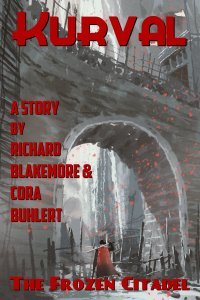 Before Kurval became King of Azakoria, he plied his trade as a wandering mercenary and sword for hire.
Before Kurval became King of Azakoria, he plied his trade as a wandering mercenary and sword for hire.
Kurval and his friend and fellow mercenary Tsabo are planning to take up service at the citadel of Harjula in the frozen north of the kingdom of Simola. But when they finally reach the citadel, they find it deserted, its inhabitants in the thrall of dark magic…
The new sword and sorcery adventure by two-time Hugo finalist Cora Buhlert and her occasional alter ego, 1930s pulp writer Richard Blakemore. This is a short story of 5900 words or approx. 22 print pages in the Kurval sword and sorcery series, but may be read as a standalone. Includes an introduction and afterword.
More information.
List price: 0.99 USD, EUR or GBP
Buy it at Amazon US, Amazon UK, Amazon Germany, Amazon France, Amazon Netherlands, Amazon Spain, Amazon Italy, Amazon Canada, Amazon Australia, Amazon Brazil, Amazon Japan, Amazon India, Amazon Mexico, Kobo, Barnes & Noble, Apple iBooks, Google Play, Scribd, Smashwords, Thalia, Weltbild, Hugendubel, Buecher.de, DriveThruFiction, Casa del Libro, Vivlio and XinXii.
September 5, 2021
A Mixed Bag: Some Comments on the 2021 Dragon Award Winners
Dragon Con, a big media con in Atlanta, Georgia, is actually going ahead in person this year, though they require proof of vaccination and masks, much to the chagrin of the usual suspects. Therefore, the 2021 Dragon Awards had an actual in person ceremony, though most of the winners failed to show up, since a packed convention centre is not exactly the safest place to be during the current covid surge.
The full list of the 2021 Dragon Award winners may be found here. There were also a couple of other awards handed out at Dragon Con. And so the winners of the 2021 Eugie Award, the 2021 Mike Resnick Memorial Award for Short Fiction and the winners of the 2021 Julie Award and the 2021 Hank Reinhardt Fandom Award have been announced as well. All seem to be highly worthy.
The Dragon Awards have been chronicled at this blog since their inception in 2016. The Dragon Awards were conceived as an award for the sort of broadly popular works that tend to be overlooked by the Hugos or Nebulas. The Dragons also have categories for multiple subgenres as well as several gaming categories.
So much for the theory. In practice, the Dragons have a tangled history, because the Sad and Rabid Puppies and other far right SFF fans originally tried to claim the Dragons as their own. Then the big Kindle Unlimited content mills discovered the Dragons, so we saw a bunch of finalists from that corner. Finally, as the Dragon Awards became better known among the general Dragon Con membership and the wider SFF community, the ballot started to look more like the popular people’s choice type awards they were intended to be.
In fact, the finalists for the 2020 and 2021 Dragon Awards looked very much like a mainstream SFF award with hardly any of the WTF? finalists that characterised the first few years of the award.
So how do the winners of the 2021 Dragon Awards measure up? Let’s take a look at the individual categories:
The winner of the 2021 Dragon Award for Best Science Fiction Novel is Project Hail Mary by Andy Weir. Now I have to admit that Andy Weir’s brand of science fiction is not to my taste, though he is very popular and far from an unsurprising winner. My own vote was for A Desolation Called Peace by Arkady Martine.
The 2021 Dragon Award for Best Fantasy Novel goes to Battle Ground by Jim Butcher, the latest novel in the Dresden Files series. This is an unsurprising win, because the Dresden Files series is hugely popular and there hadn’t been a new novel published in this series since Skin Game in 2014. Jim Butcher is also a Dragon Con regular and was one of the few winners who actually showed up in person to accept his award. Coincidentally, this was also my choice.
The winner of the 2021 Dragon Award for Best Young Adult/Middle Grade Novel is A Wizard’s Guide to Defensive Baking by T. Kingfisher. I’m a big fan of T. Kingfisher a.k.a. Ursula Vernon and A Wizard’s Guide to Defensive Baking is a lovely novel, so I’m very happy that it won. This was also my choice in this category.
The 2021 Dragon Award for Best Military Science Fiction Novel goes Gun Runner by Larry Correia and John D. Brown. Now I’m very much not a fan of Larry Correia and find reading his fiction about as pleasant as a visit to the dentist, but he is very popular plus Baen Books has always had a strong presence at Dragon Con. My own vote was for Fleet Elements by Walter Jon Williams.
The winner of the 2021 Dragon Award for Best Alternate History Novel is 1637: No Peace Beyond The Line by Eric Flint and Charles Gannon. Now I have to admit that the popularity of the 1632 series baffles me. The basic idea is not bad, but the first book was so riddled with errors (and not errors introduced due to the jonbar point/Nexus event, but just plain old errors) that I abandoned it. Maybe subsequent books are better, though I’ve never gone back to find out. However, Eric Flint is another author with a strong fanbase at Dragon Con and was apparently also involved in the creation of the Dragon Awards. My own vote was for Charlaine Harris BTW, who’s exactly the sort of popular but overlooked by awards author the Dragons were made for.
The 2021 Dragon Award for Best Media Tie-in Novel goes to Firefly: Generations by Tim Lebbon. I’m happy for Tim Lebbon, one of whose original novels we featured at the Speculative Fiction Showcase. Though I’m surprised that Star Wars: Thrawn Ascendancy by Timothy Zahn didn’t take this one, but then the Thrawn character maybe isn’t as iconic for younger Star Wars fans as he is for those who read Heir to the Empire when it came out in 1992, ending a several year draught of new Star Wars content. Meanwhile, the MacGuyver people, who campaigned so hard to get a MacGuyver tie-in novel on the ballot, don’t have enough clout in the larger genre community to win. My own vote was for Penitent by Dan Abnett, by the way.
The winner of the 2021 Dragon Award for Best Horror Novel is The Hollow Places by T. Kingfisher. This was something of a surprise, since The Only Good Indians by Stephen Graham Jones has won every other horror award there is this year (and well deserved, too). However, it’s a pleasant surprise, because as I said above, I’m a big fan of T. Kingfisher a.k.a. Ursula Vernon, so this book was also my choice. Coincidentally, I think this is the first time that an author has won two Dragon Awards in the same year.
The 2021 Dragon Award for Best Comic Book is the current run of X-Men. This is hardly surprising, because X-Men is a popular mainstream superhero title and was Marvel’s bestselling title in the 1980s and 1990s, though it has fallen from those heights in recent years. My own vote was for Monstress.
The winner of the 2021 Dragon Award for Best Graphic Novel is The Magicians: New Class by Lev Grossman, Lilah Sturges and Pius Bak. This win surprised me a bit, probably because I never really connected to The Magicians. But both the novel series and particularly the TV series were very popular indeed. My own vote was for PULP by Ed Brubaker and Sean and Jacob Phillips, which pushed all my buttons.
The 2021 Dragon Award for Best TV Series goes to The Expanse, which I seem to recall has won in this category before. It’s also a very popular (and good) series, though I expected one of the two Marvel/Disney Plus series to win. My own vote was for WandaVision BTW.
The winner of the 2021 Dragon Award for Best Science Fiction or Fantasy Movie is The Old Guard. This is one win which makes me really, really happy, because I enjoyed The Old Guard a whole lot. I mean, how could I not enjoy an update on the Highlander concept (and I and my whole circle of friends were huge fans back in the day) with a badarse female lead and a sweet and deadly gay couple? And of course, this was also the film I voted for.
I can’t say much about the gaming categories, because I’m not a gamer. That said, I kept seeing ads for that Harry Potter mobile puzzle game on my phone for several months and they annoyed the hell out of me. But I guess Harry Potter is still popular, J.K. Rowling’s recent bad behavious notwithstanding.
All in all, the Dragon Awards increasingly look like the award for broadly popular works that they were intended to be. Not all the winners were my choice and there are a few I dislike intensely, but none of them were unlikely winners.
The Dragon Awards are still a lot whiter and a lot more male than the Hugos and Nebulas – and no woman not named T. Kingfisher won in the fiction categories – but then mass popular vote awards often tend male and white, because books by established and popular white male authors still get more promotion and attention.
So in short, the Dragons are on track to what they wanted to be in the first place. There are several very good winners, a few that are not to my taste, but none that are an embarrassment to the award.
So let’s see what 2022 brings!
Cora Buhlert's Blog
- Cora Buhlert's profile
- 14 followers


